Last updated: 24th February 2024
In this post we’ll show you how we experienced travelling across India in a small group tour using the famous sleeper trains. We’ll give you our tips and advice for surviving Indian sleeper trains and what the train classes mean plus what facilities you can expect to find on board.
Table of Contents
Planning Our Tour Of India By Sleeper Trains
We looked for a small group tour of India that included travelling by rail instead of planes or buses. We wanted a bit of an adventure to see what it was really like travelling on the India’s sleeper trains just like the locals do across the country. However we also wanted to save money for spending, so we knew wouldn’t be booking the luxury ‘Palace On Wheels‘ or the famous ‘Maharajas Express‘.
We’ve experienced sleeper trains in China and they are a delight, but it’s well known the standard of seats and sleeping carriages in India are nothing like that of China or Europe. So was it going to be like the images we’ve seen of people standing and sitting on train roofs? Whatever happened we knew it was going to be an experience. We’ll tell you all about it in this post, plus our essential tips for how to survive Indian Railways sleeper trains.
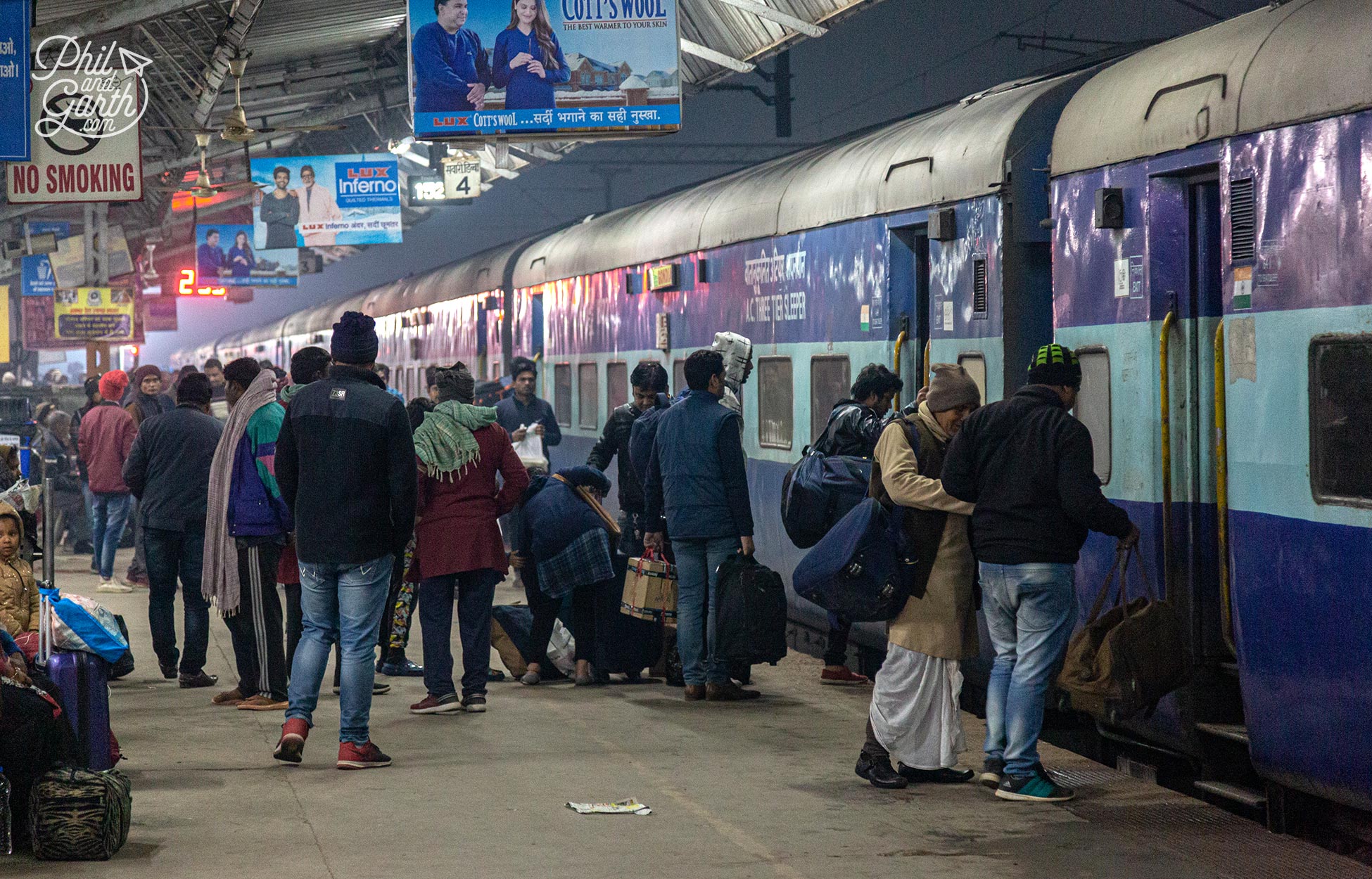
People getting onto a sleeper train in India
About Indian Railways
Connecting India
The British introduced railway trains to India in 1853. Today Indian Railways is 4th largest network of trains in the world. It’s run by the government who operate 14,000 passenger trains, transporting 23 million passengers every day to 7,349 stations. Wow. It connects remote towns with big cities across the length and breadth of India’s diverse terrain.
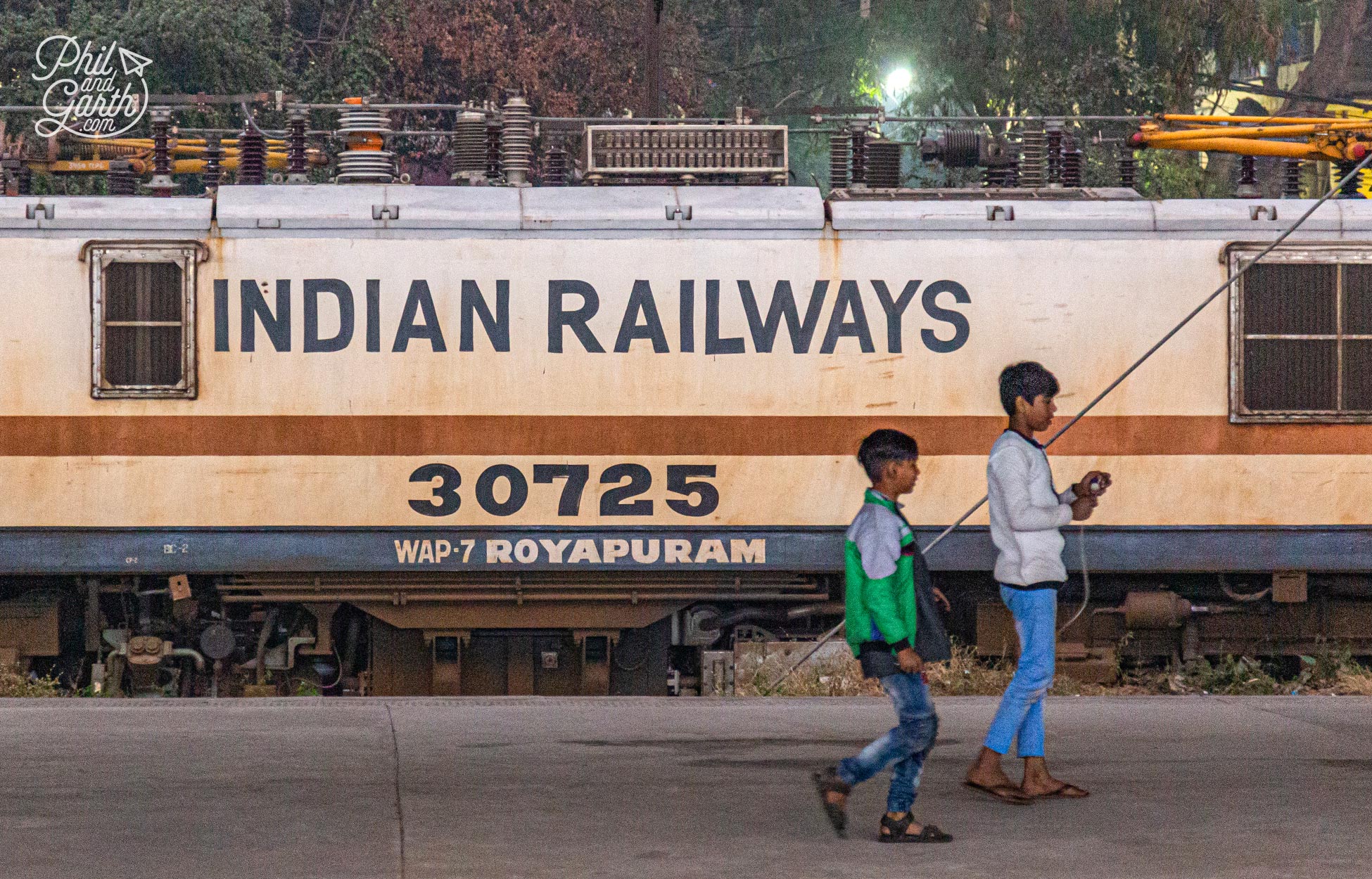
The Indian Railways network is the life-blood of the country connecting remote towns with big cities
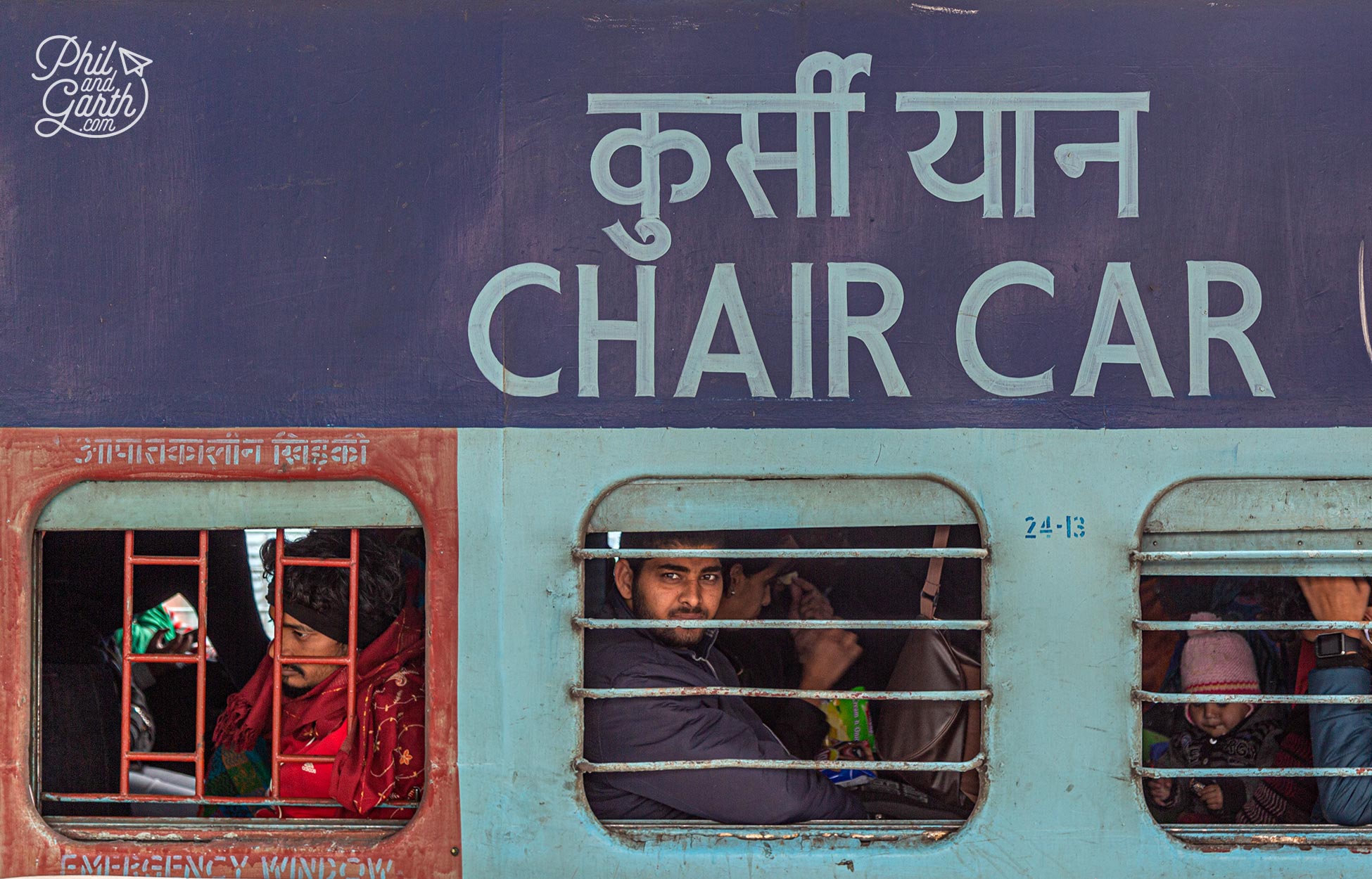
An Indian Railways Chair-Class carriage. The bars on the windows are to stop people from outside getting in for free
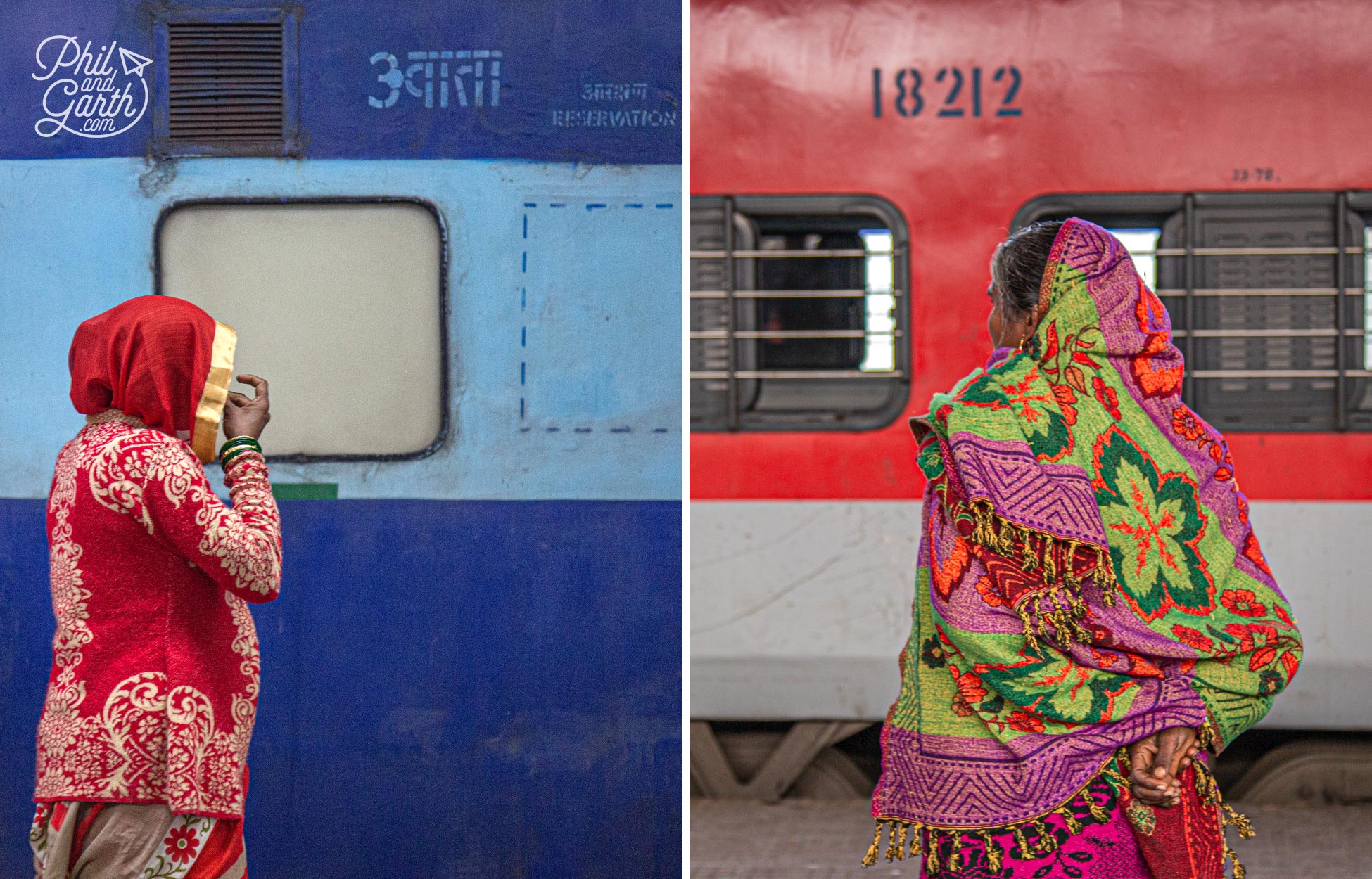
An adventure of a lifetime travelling by sleeper trains in India
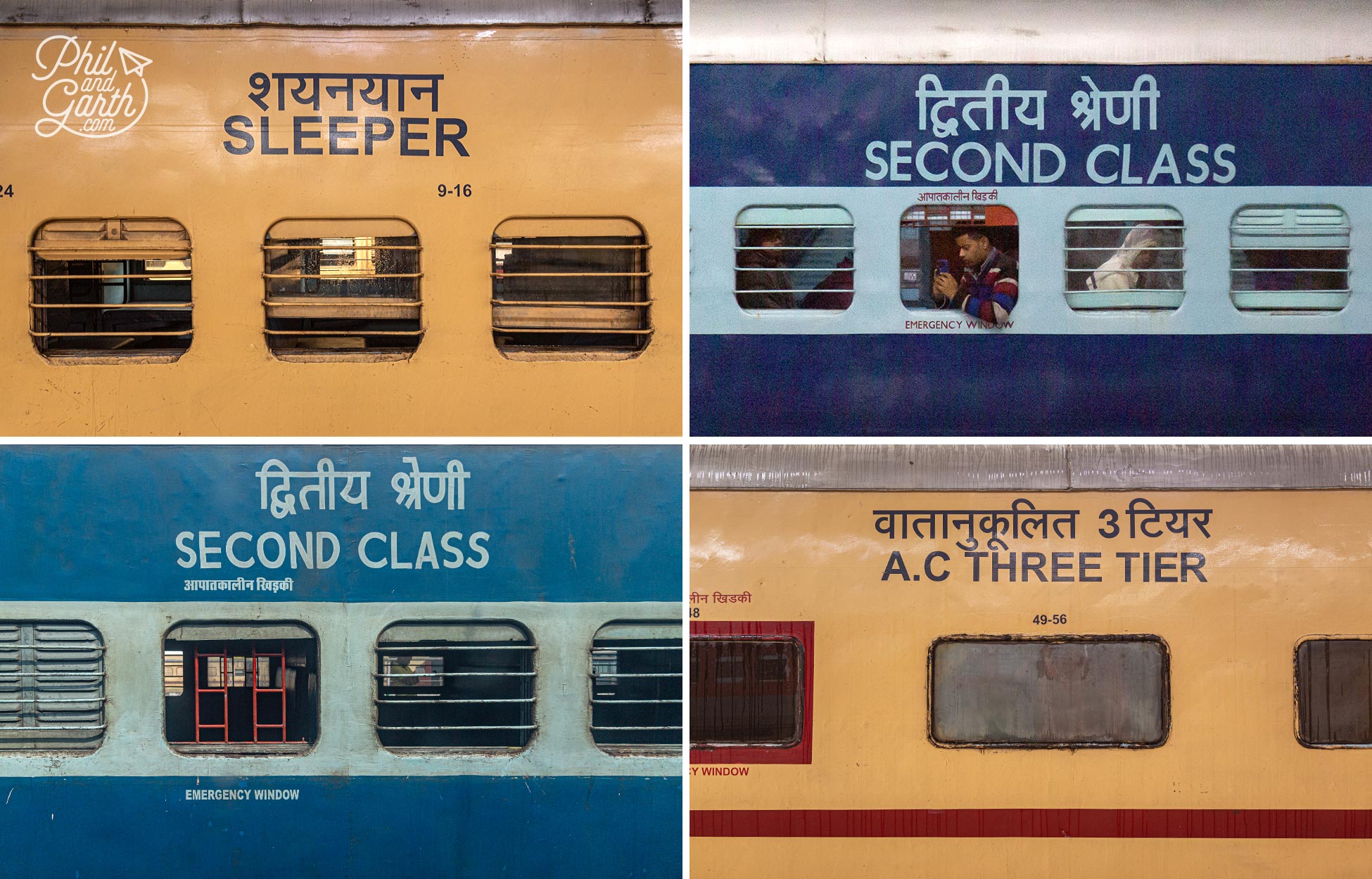
There are 8 different classes on Indian Railways but not on every train
Indian Railways Sleeper Train Classes
There are 8 different classes in total and vary depending on the train and destinations. We’re only interested in the sleeper classes and these break down as follows:
- AC1 (or A-1) – These carriages are air conditioned and are 1st class, however there’s not many trains and routes with this class. They have individual 2 bunk bed (berths) cabins with lockable doors. Carriages also have shower cubicles.
- AC2 (or A-2) – This is 2nd class with air conditioned carriages and open plan 2 bunk beds grouped in bays of 4 beds. Plug sockets by the windows and one privacy curtain. There’s also 2 bunk beds along the corridors which have individual curtains and lights. Sheets and a pillow are provided. Typically used by middle class Indian families and tourists. During the day all the bunk beds are folded down into seats.
- AC3 (or A-3) – Same facilities as AC2 class, the only difference is they are busier because they have more beds – 3 tier bunk beds (upper, middle and lower) are grouped in bays of 6 beds plus 3 bunk beds along the corridors. Unlike AC2 there are no privacy curtains.
- SL – Standard sleeper class, is 3rd class and it’s how most Indians and backpacking tourists travel. 3 bunk beds are arranged in bays of 6 beds, with 2 bunk beds along corridors. There’s no air conditioning just fans and open windows with bars to prevent people getting in from outside. You need to take your own sleeping bag as no bedding is provided.
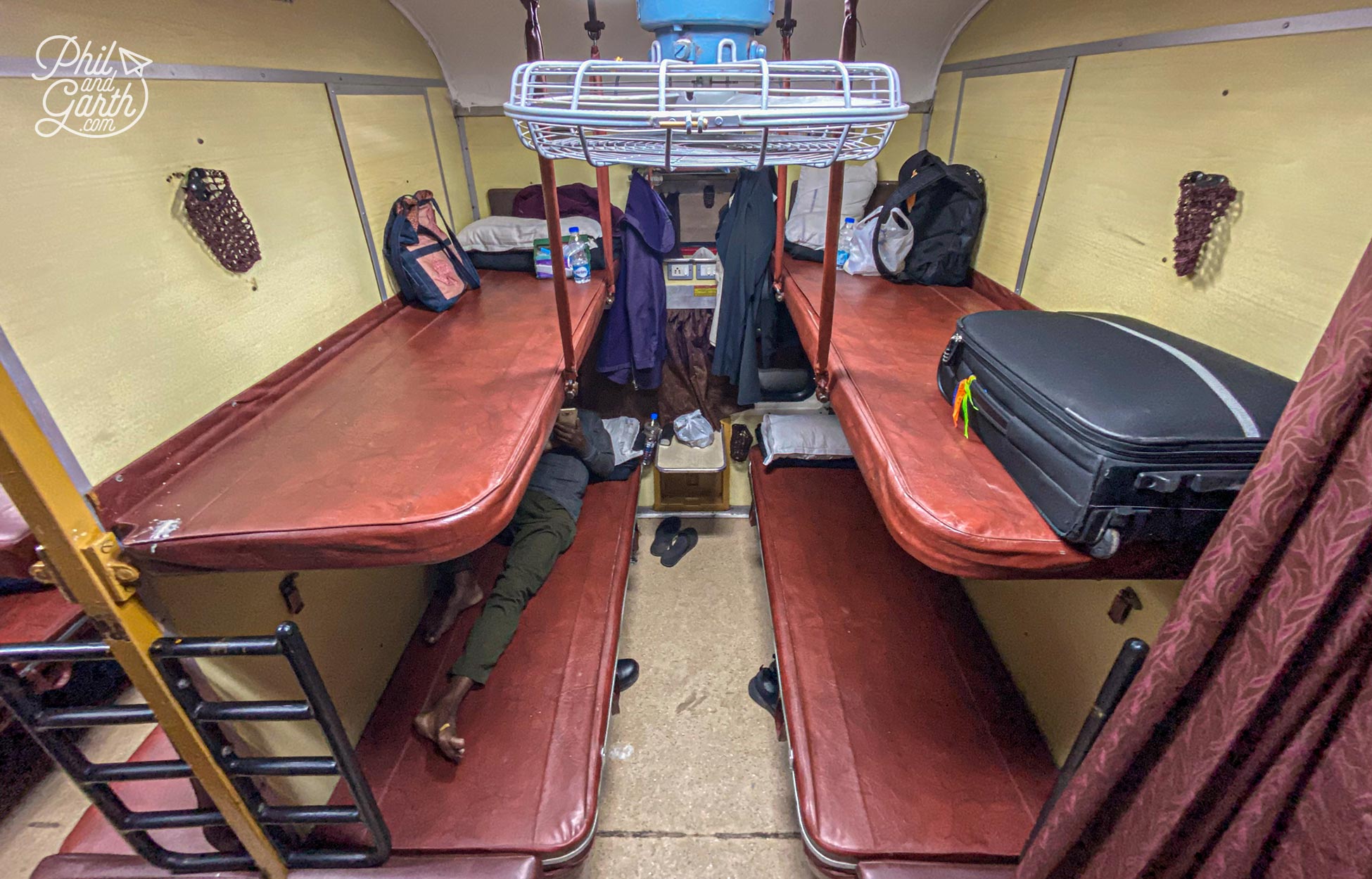
Example of AC2 2-berth grouped in bays of 4 beds
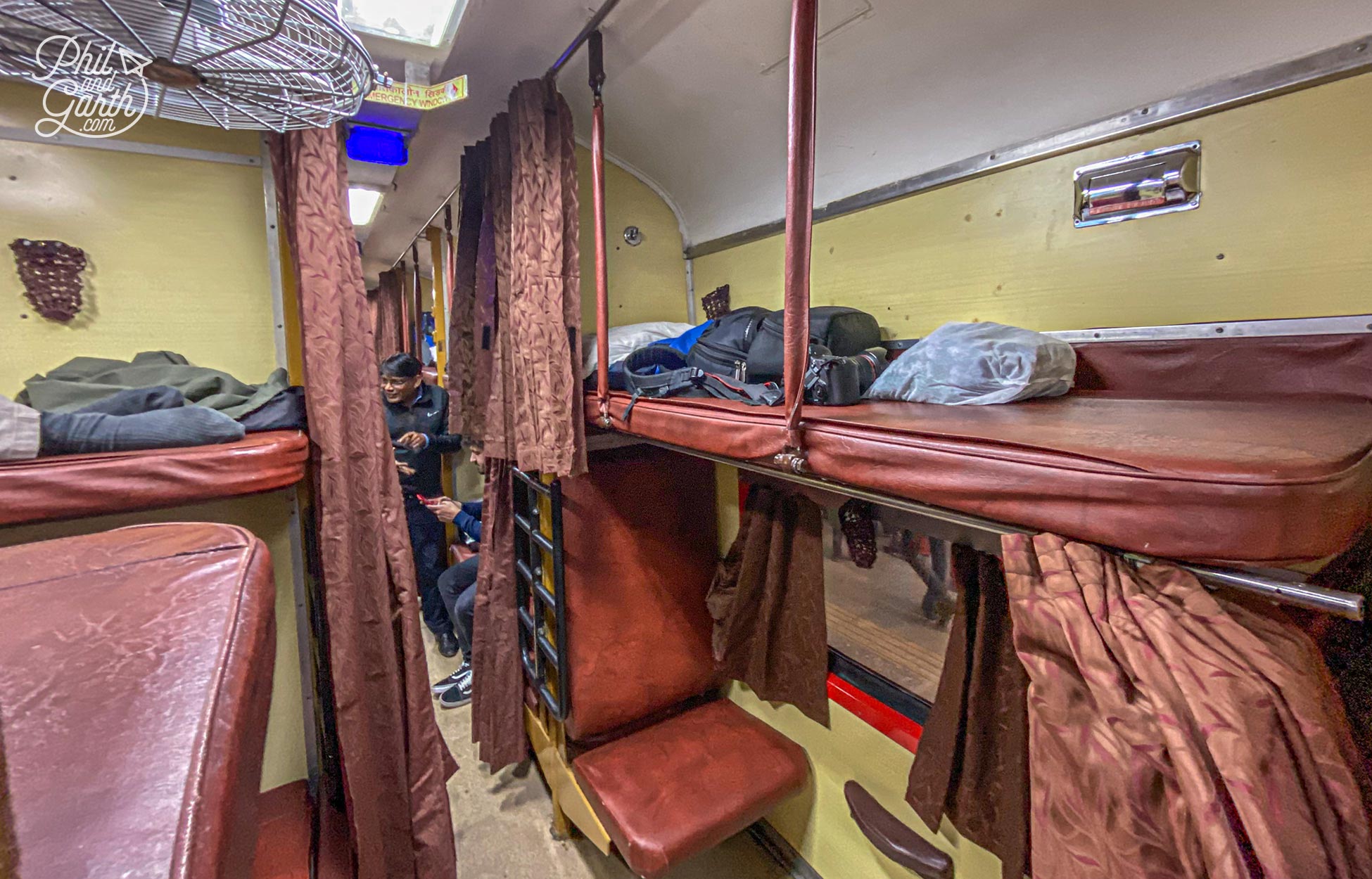
Here’s what the AC2 2-berth beds look like on the opposite side along the corridor
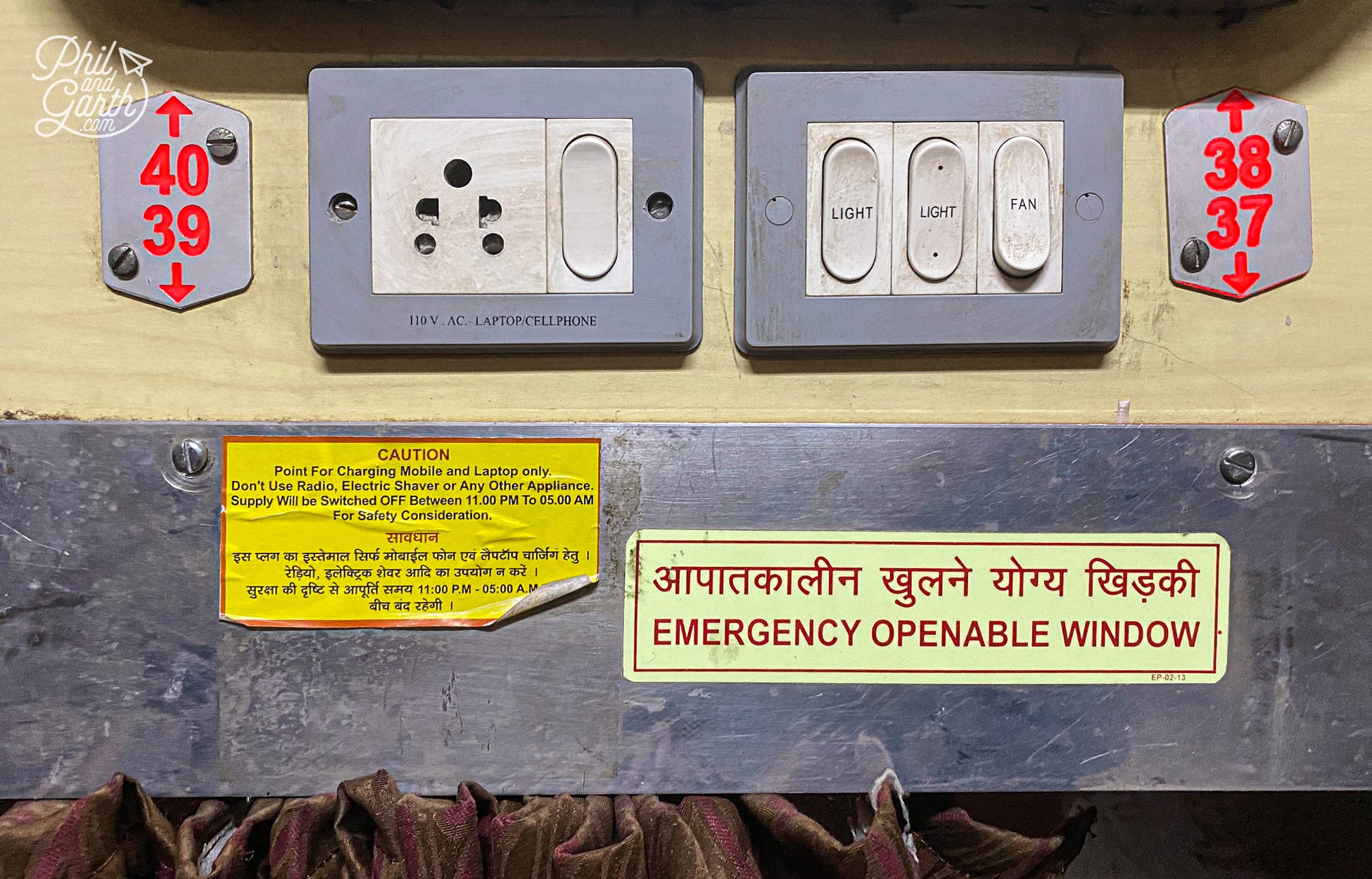
Electricity plug sockets are available on AC2 & AC3 air conditioned carriages underneath the windows
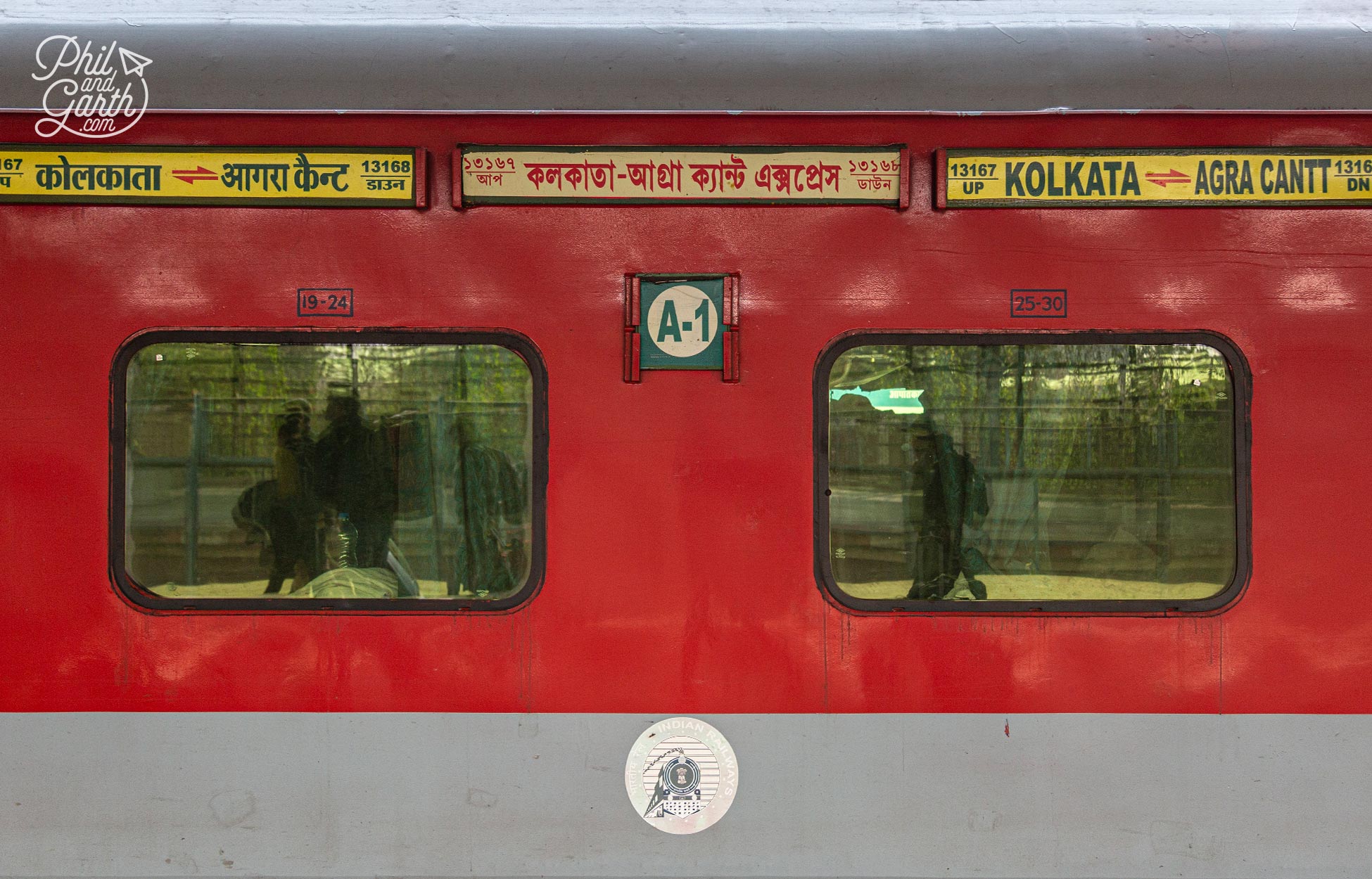
AC1 Class – This is first class sleeper train travel with individual cabins with lockable doors
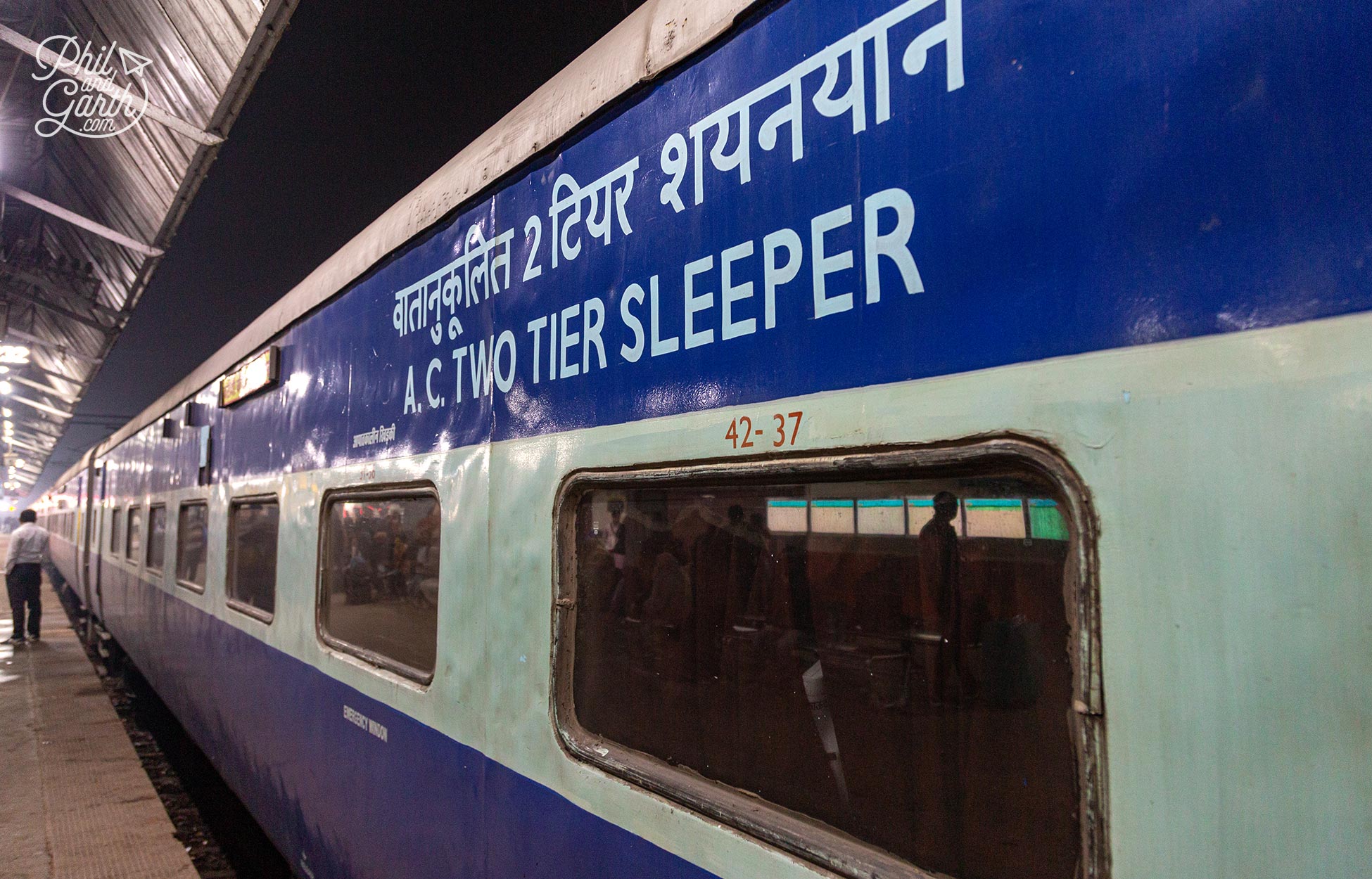
AC2 Class carriage – Trains are either blue or yellow
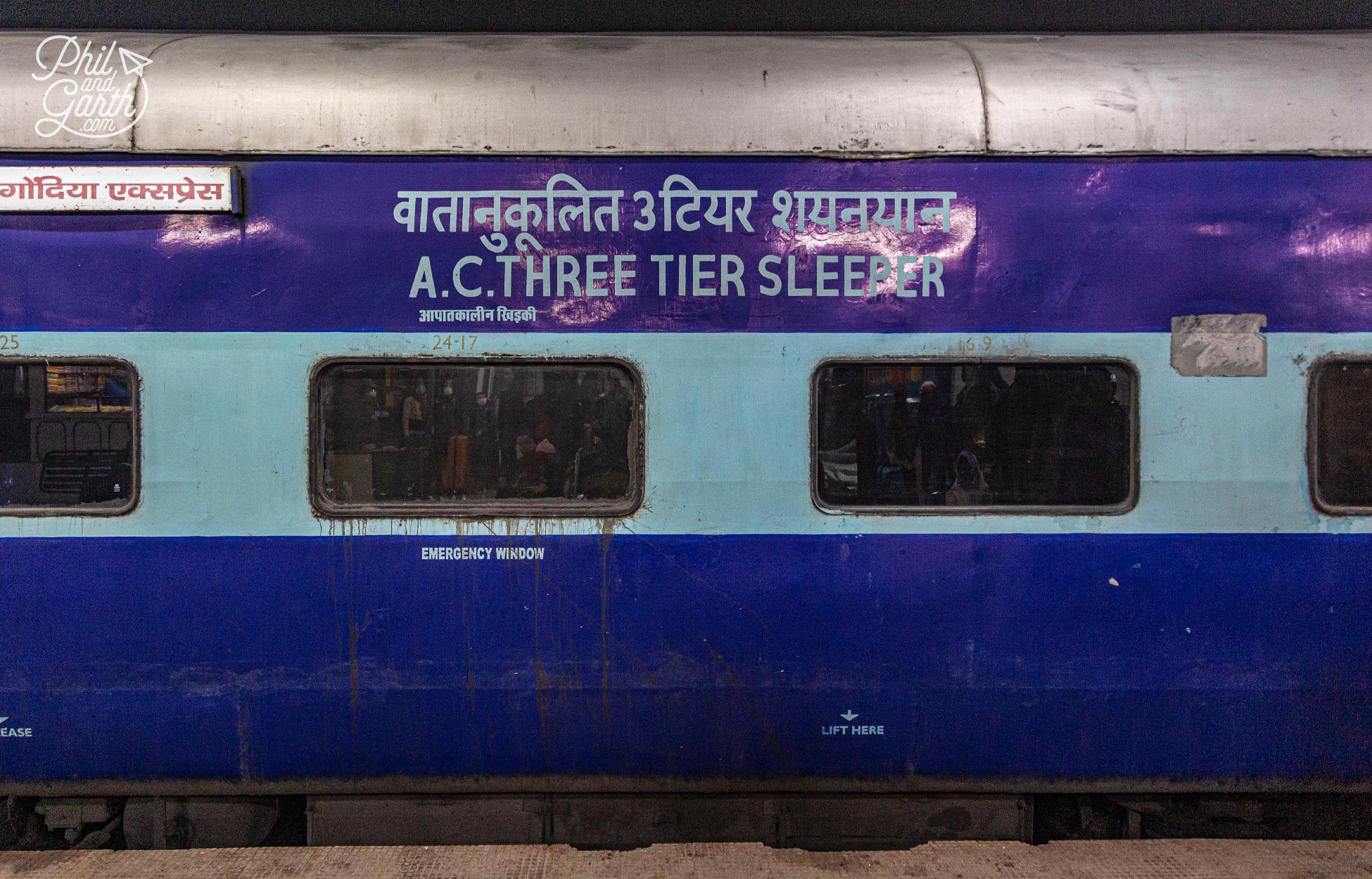
AC3 Class – Three tier bunk bed sleeper trains
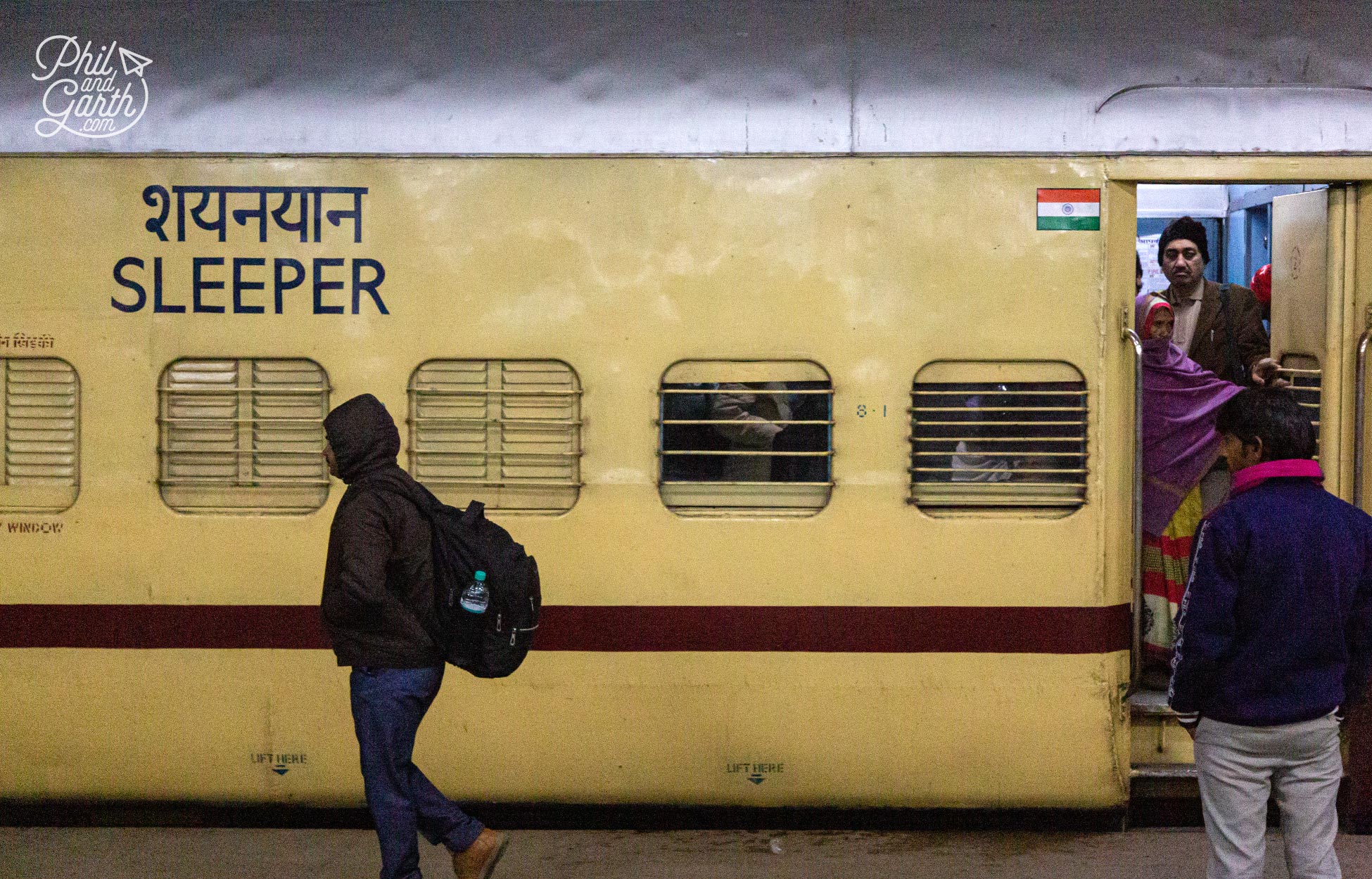
SL Class – Regular sleeper trains used by the masses and backpackers
Our Indian Sleeper Train Experiences!
Delhi to Udaipur Sleeper Train
We took our first overnight sleeper train from Delhi to Udaipur. At 5pm we arrived at the Hazrat Nizamuddin railway station in good time ready for boarding at 7pm. We were excited, but probably more nervous, would it be clean? would we sleep? As you enter the station, like all rail stations in India you need to go through the airport style security and have your cases x-rayed and documents checked to get to the platforms.
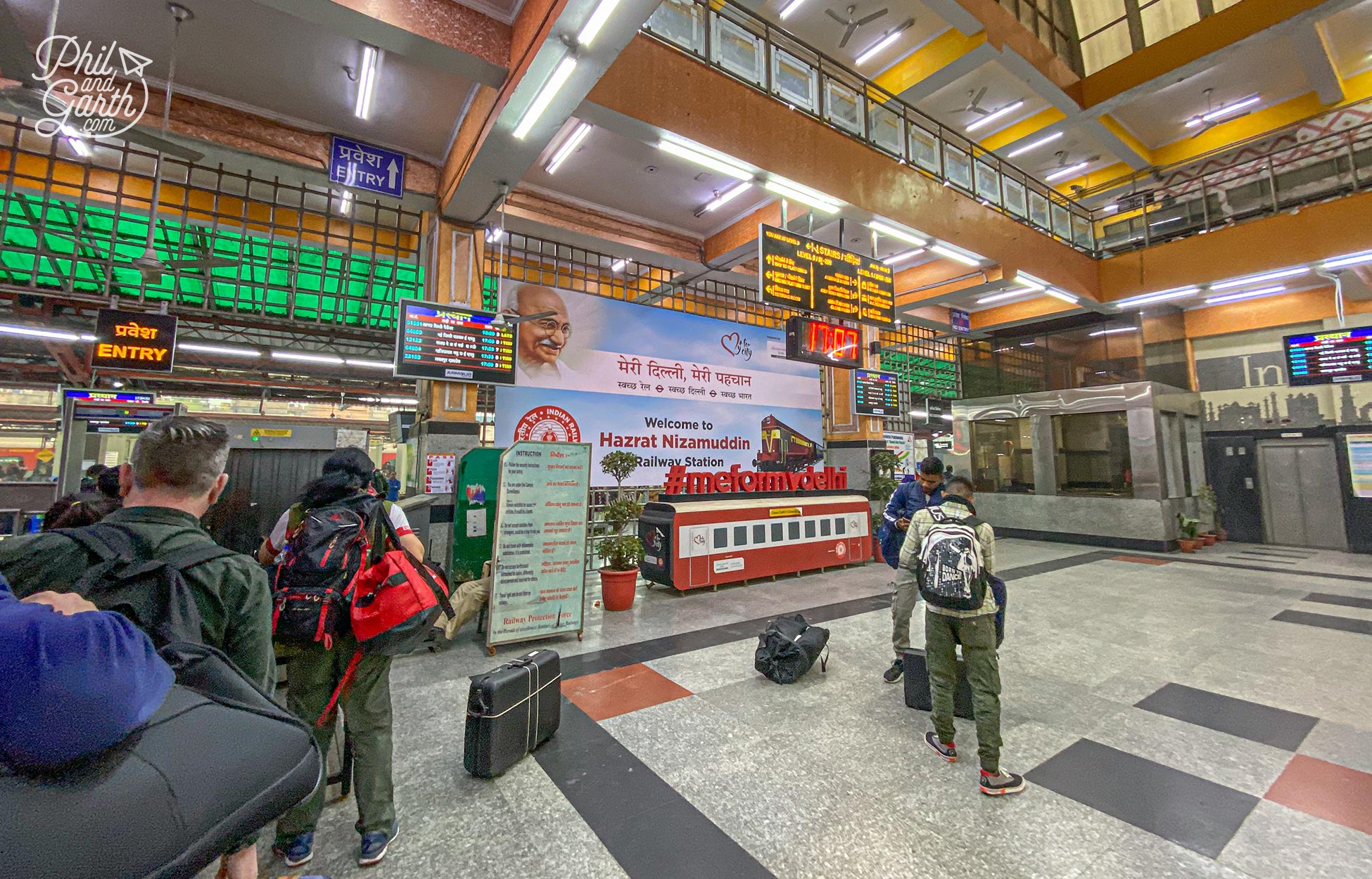
Going through the aiport style security at South Delhi’s Hazrat Nizamuddin railway station
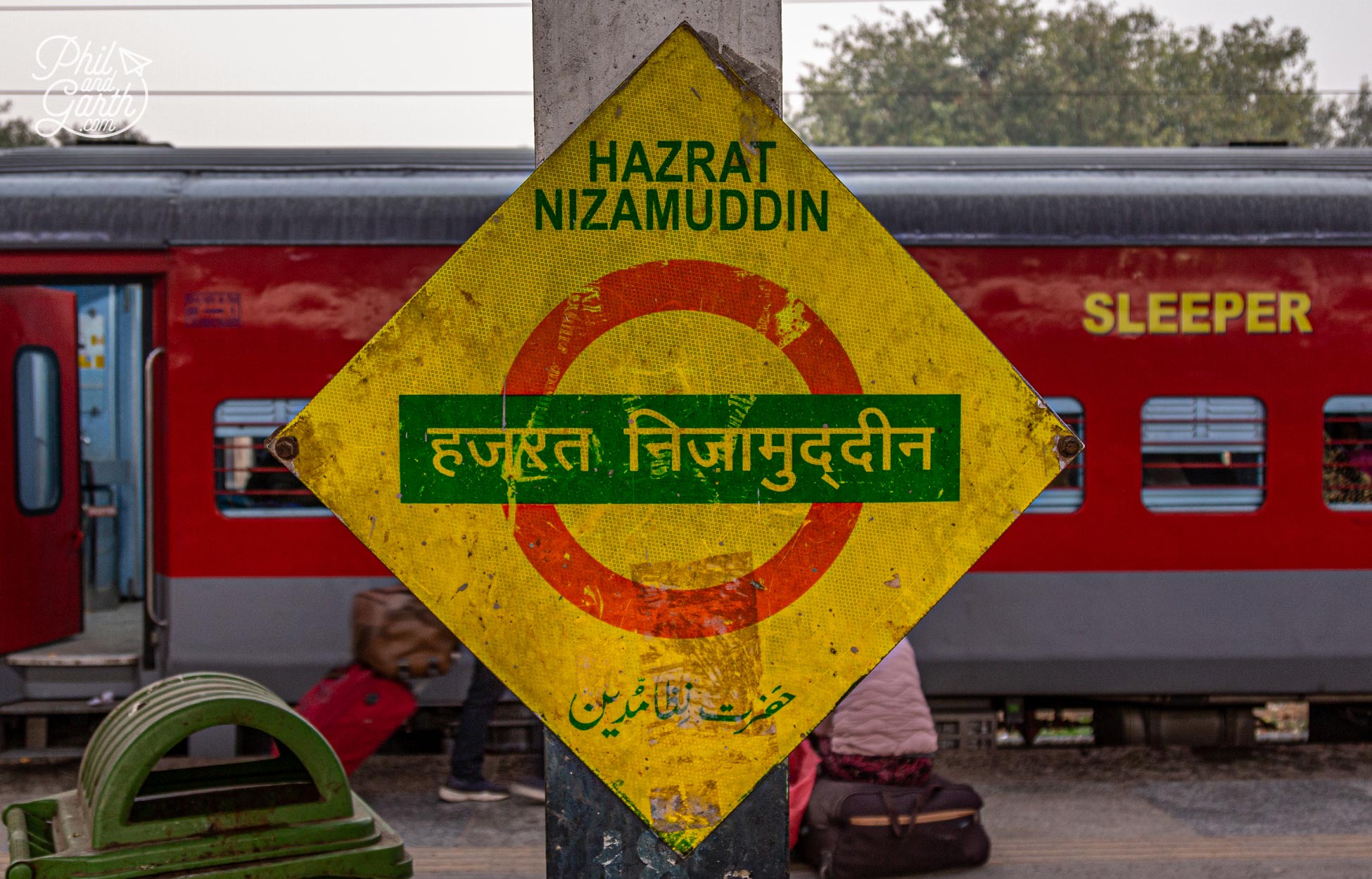
Hazrat Nizamuddin railway station sign
Waiting For Our Sleeper Train
At the platform lots of people were staring at us and taking discreet and non discreet photos, it was quite funny. We didn’t see any other Western tourists here as not many people stop to explore Delhi. Remember many local people will have never seen Westerners so they are just curious. A couple of people approached us for a selfie.
The platforms are super long because the trains are really really long. So the number of people waiting at station platforms are huge. It’s an experience in itself just watching the bustle of daily life go by. Platforms are full of families sitting and sleeping on the floors aswell, some with huge parcels to transport. Phil thought a sight of goods balanced on the medieval looking carts make it looked like a scene from theatre, like a pantomime set.
It was fascinating watching the talent of some people who prefer to balance their suitcase on their head. The luggage porters also do this and work really hard. We saw one porter carrying 3 massive suitcases whilst balancing another on his head! Apparently porters of being done out of jobs because they’re installing escalators at stations. Talking of which we saw a group of elderly ladies who clearly had never seen or used an escalator before.
At station platforms there’s lots of food stalls selling chai (sweet tea), canned drinks, crisps and biscuits. Hazrat Nizamuddin was probably the most modern of the stations we experienced and had a nice clean snack bar and waiting room. India is still a developing country and they are building more of these cleaner and hygienic eating areas as demand is there from middle class Indians. We had a vegetable biryani and some Pepsi (nowhere sells Garth’s Diet Coke).
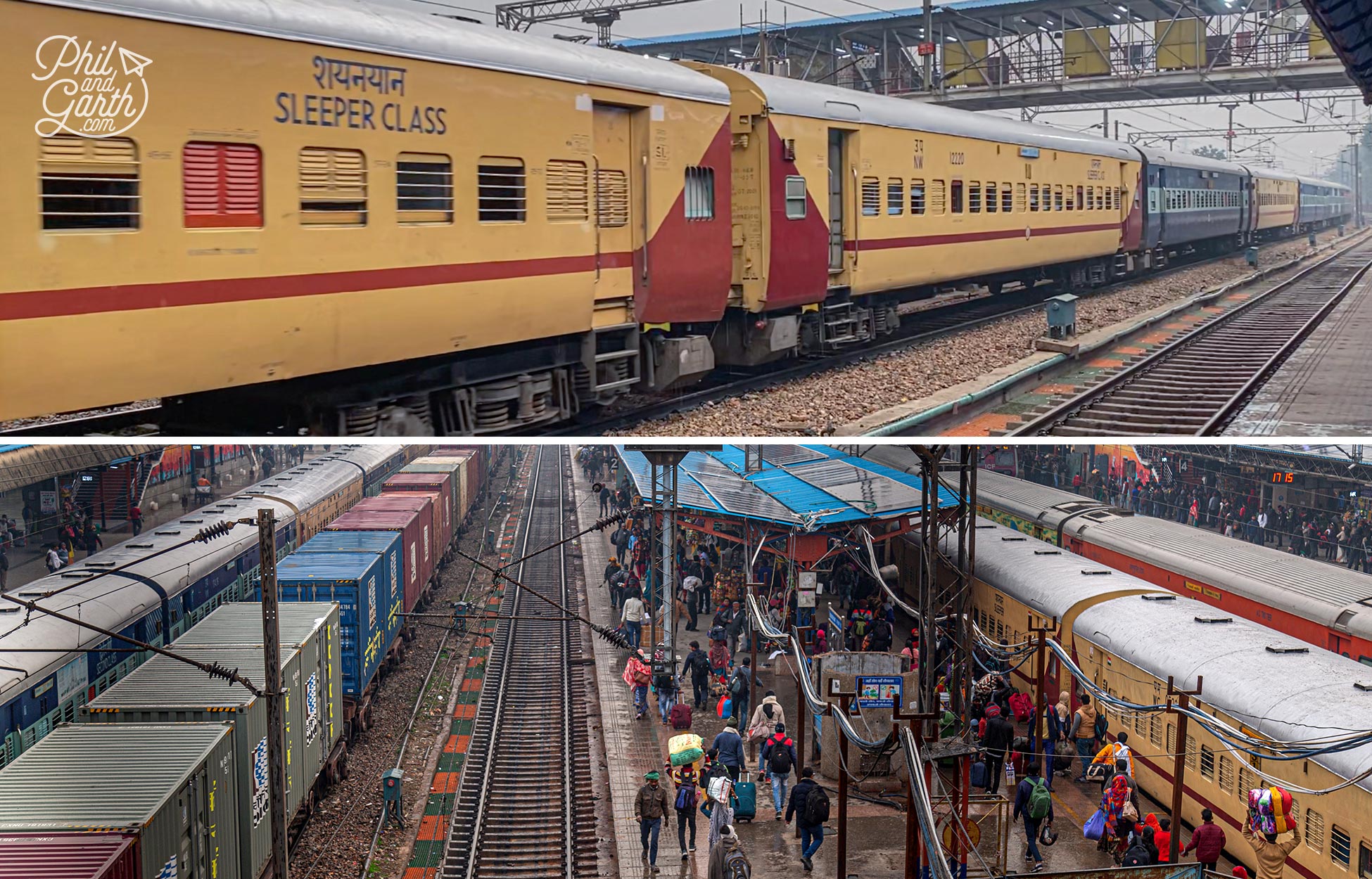
Indian sleeper trains are incredibly long, so may carriages!
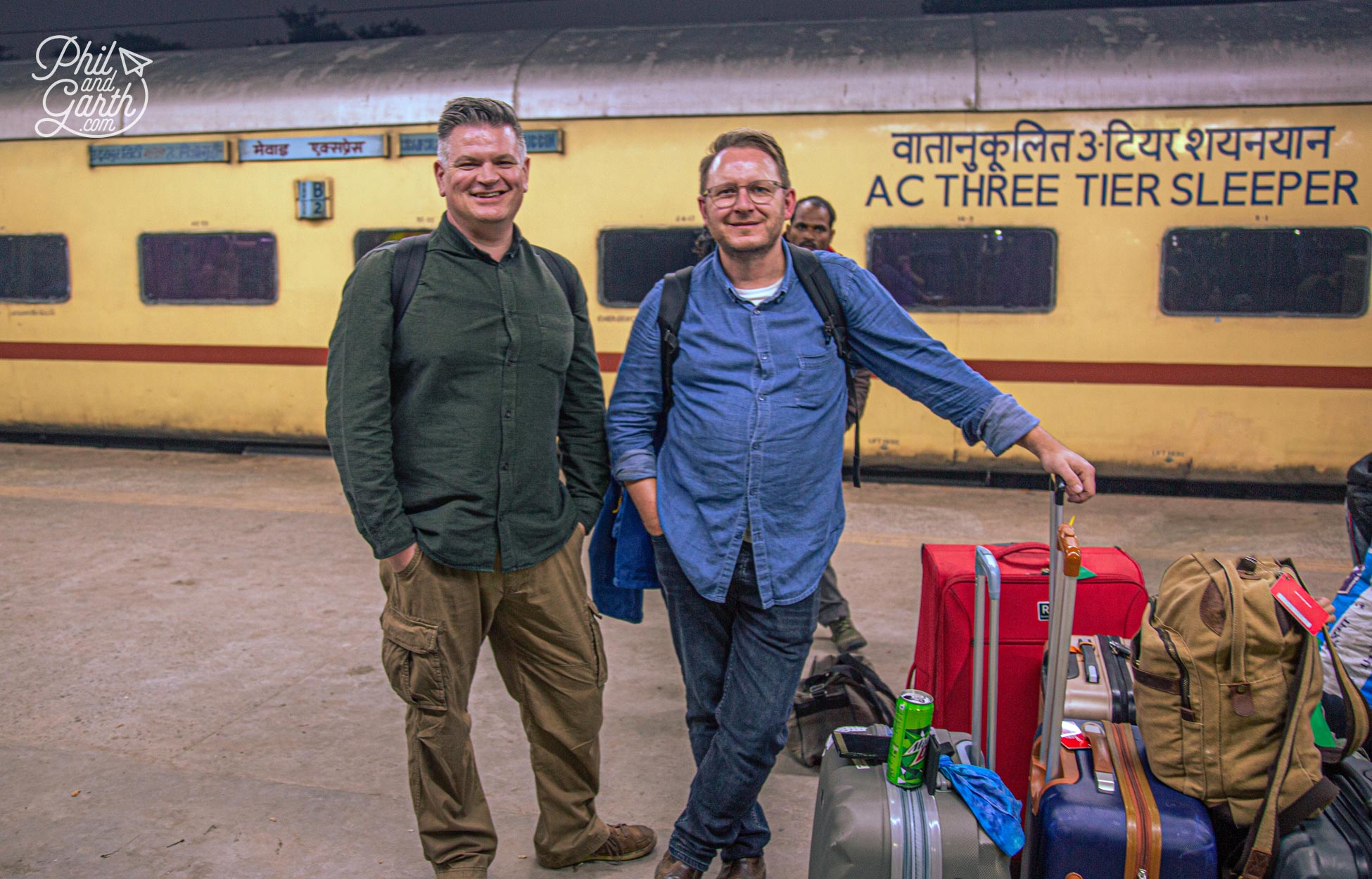
Waiting in Delhi for our sleeper train
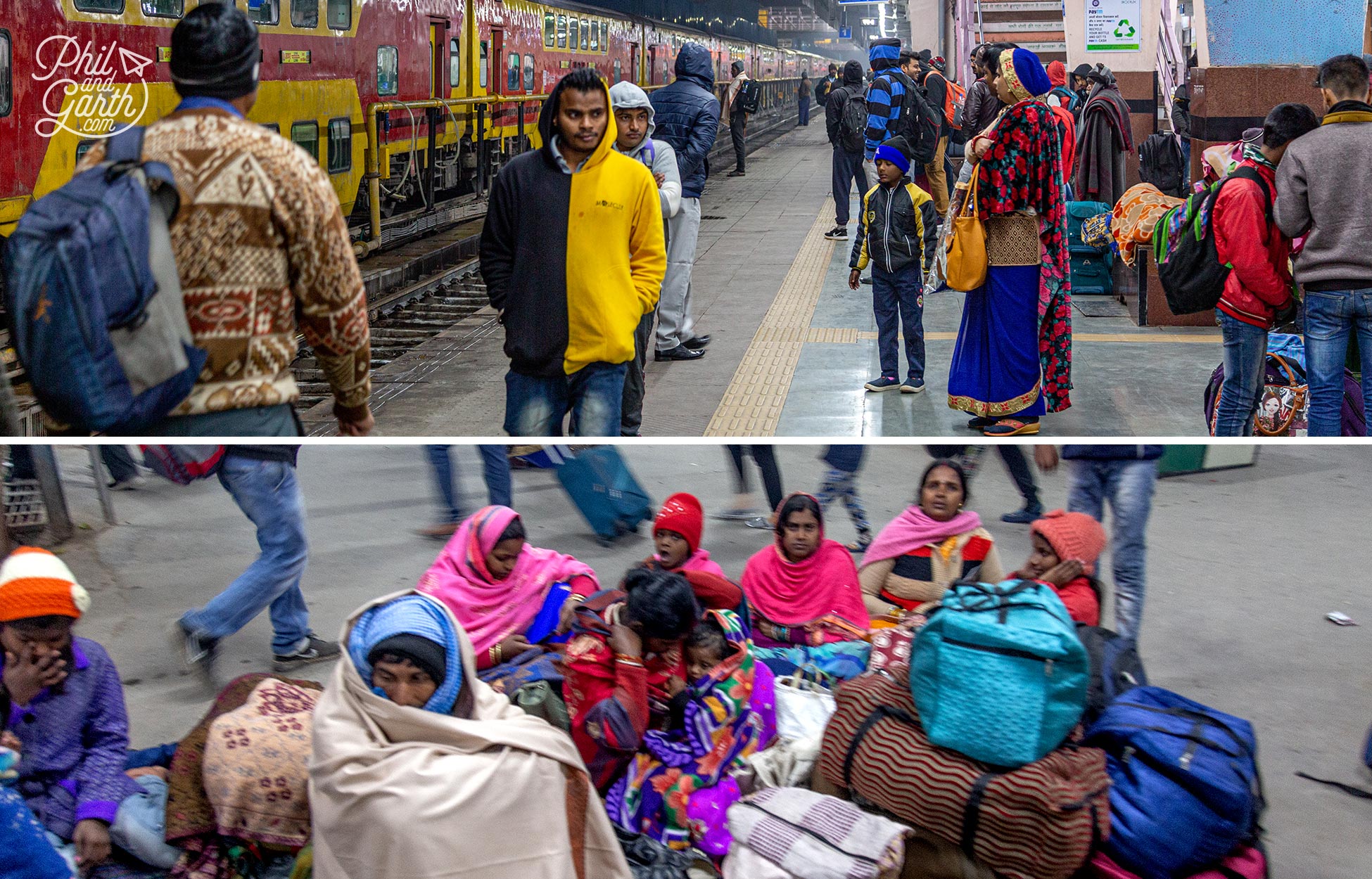
Standing on the platform watching the bustle of daily life go by
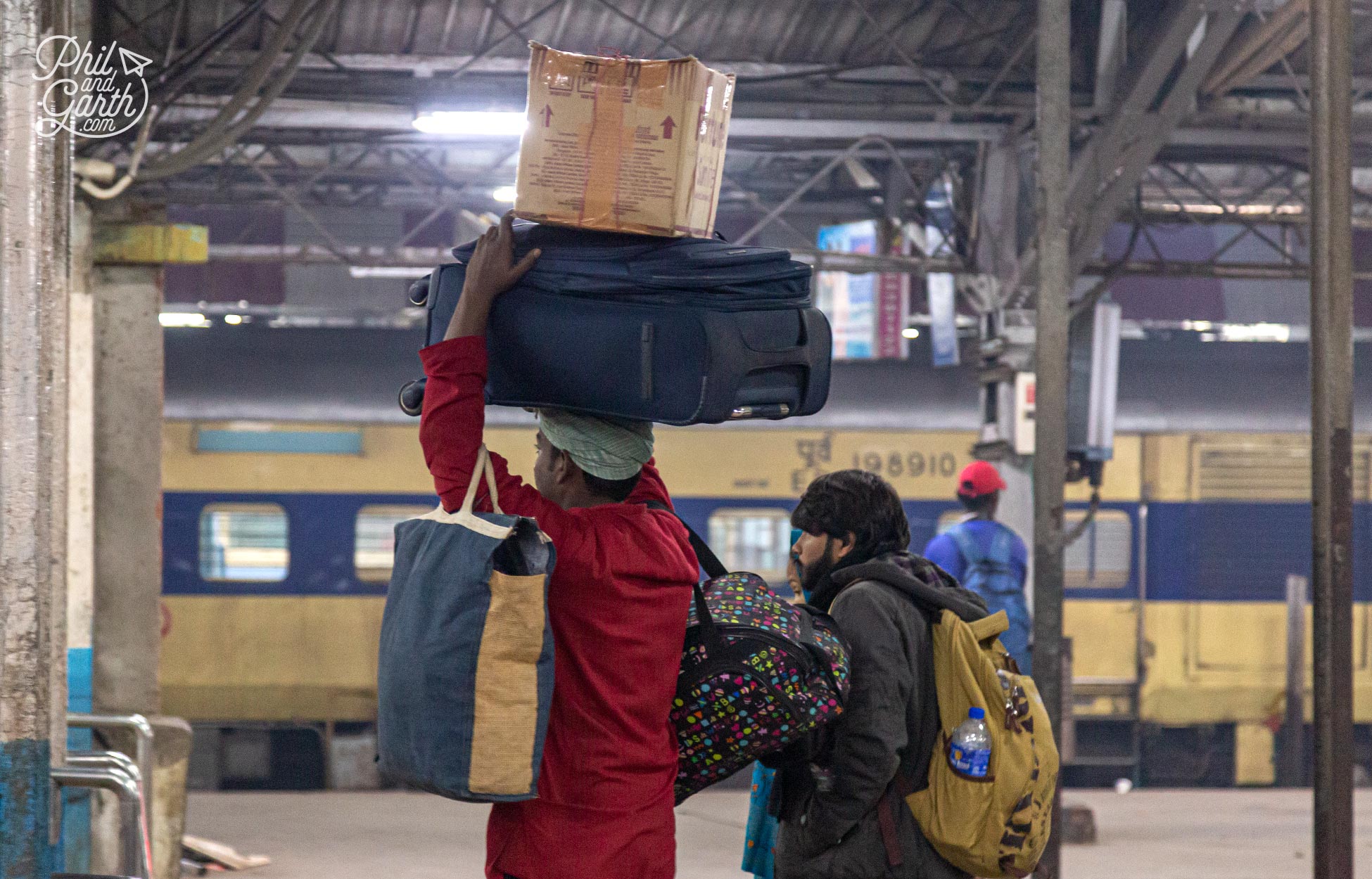
Luggage porters wear red blazers and carry huge loads, even on their heads
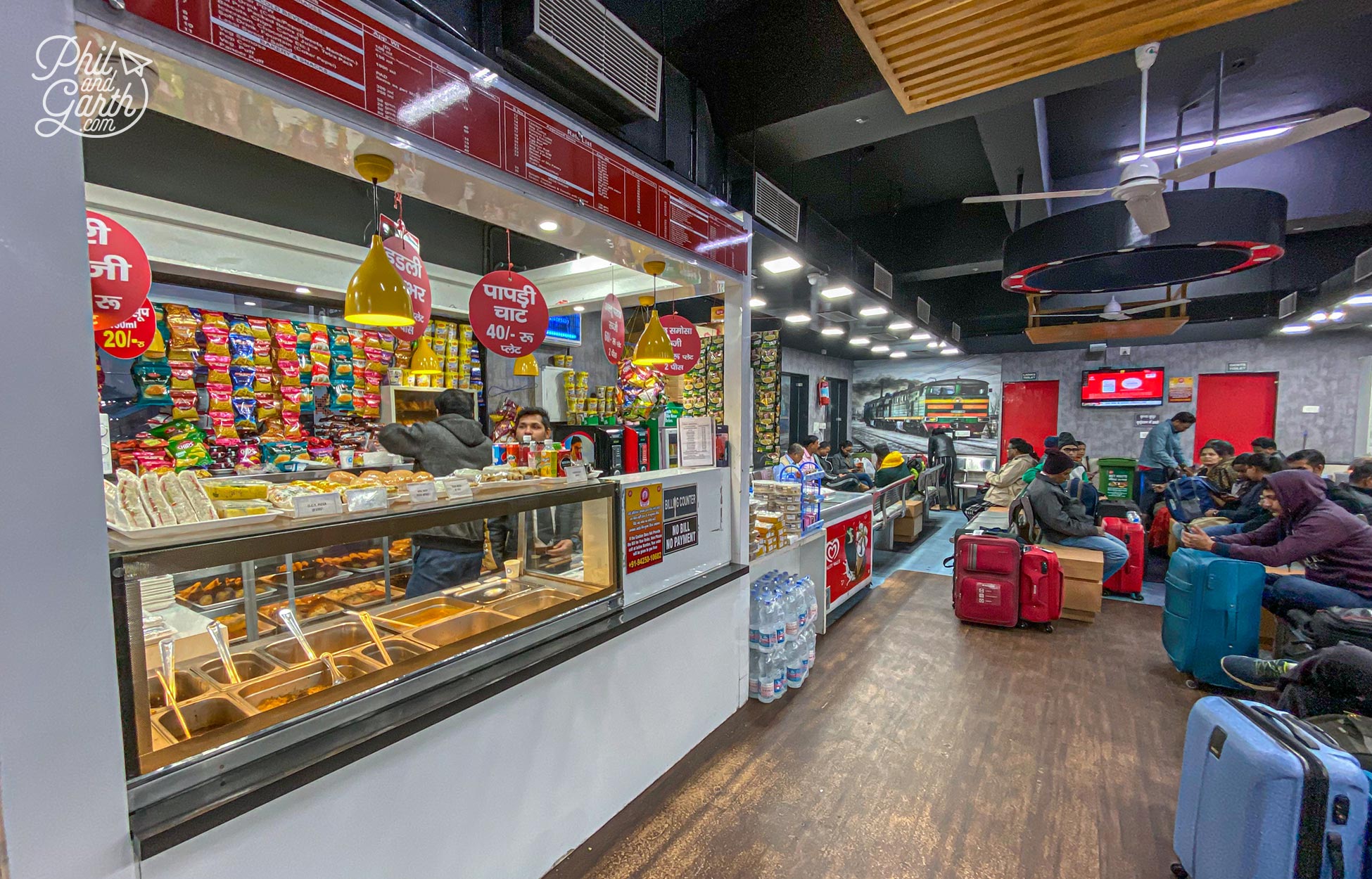
A very nice snack bar and waiting lounge at Delhi’s Hazrat Nizamuddin station
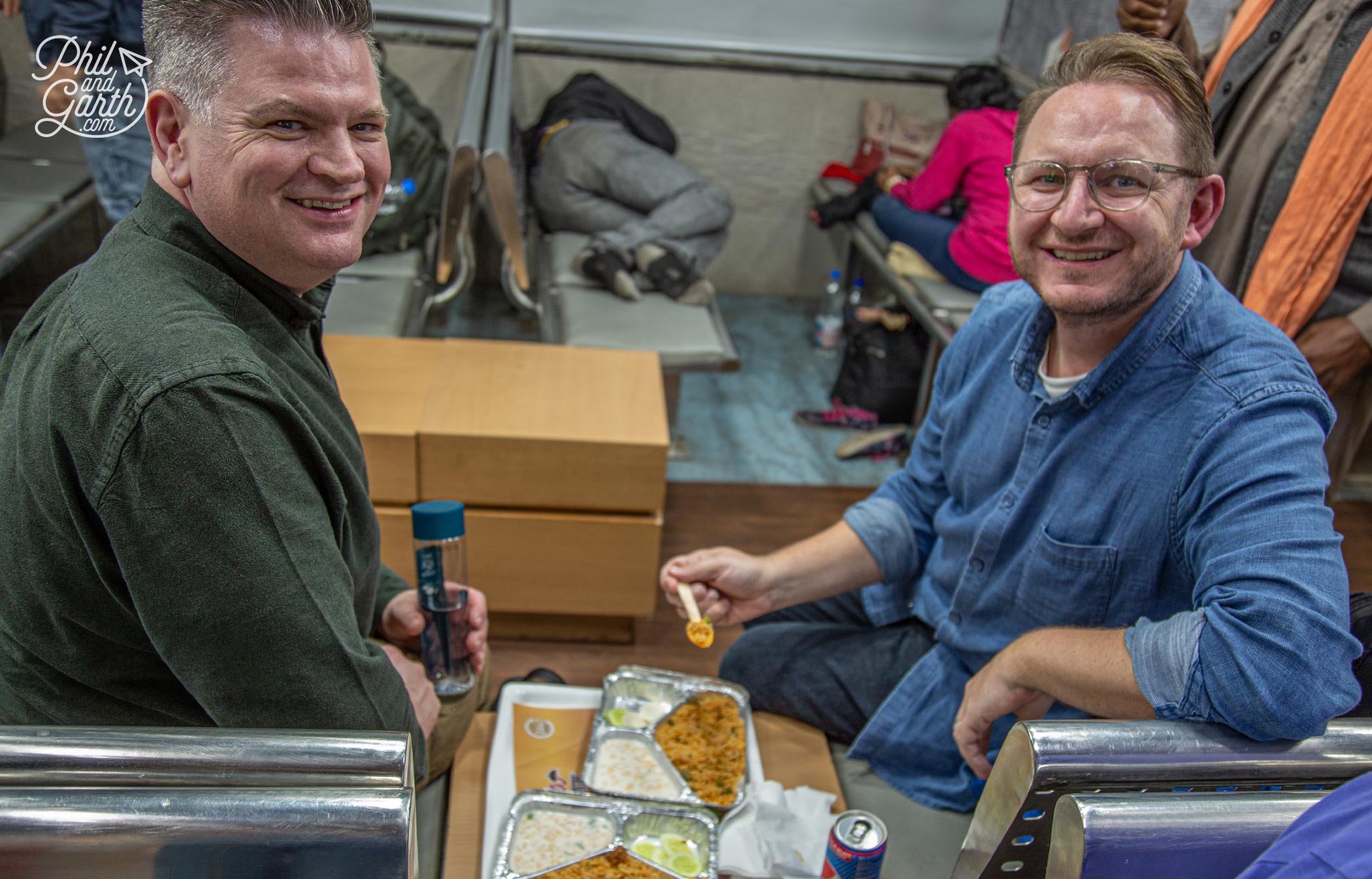
Enjoying our vegetable biryani before boarding the sleeper train
On Board The Sleeper Train
From the outside sleeper trains look quite antiquated, inside is better though. We boarded our AC-2 carriage and found our seats pretty quickly, look up to the ceiling for the blue signs to find your seat/bed number. Other members of our group had to ask people to get out of their bed, so don’t be afraid to ask. Padlock your cases to the hooks under the seats as soon as you can before others take up the space.
We both had a top bunk bed along the corridor. We immediately realised you need to forget the idea of personal space and privacy as everything is open plan, however it’s all quite civilised. The corridor top bunks may be problematic for older people getting into and not best for those who suffer with claustrophobia once the curtain is closed.
In every AC carriage a train attendant will bring you a brown paper bag containing a starched and ironed bed sheet, a rough woollen blanket and a pillow. We were pleased to see they were clean on every sleeper train we took. We took with us a light silk sleep sheet however we only needed to use these once.
Our overnight train journey from Delhi to Udaipur was 12 hours long. It was an express service with 20 stops which stop for around 5 minutes. It was a little disappointing to see the windows were really dirty, so you can’t see out. This is the case for all trains, don’t expect to see too much outside. In the morning our group discussed how much sleep we got – Garth had 1.5 hours sleep and Phil managed 2 hours. We felt incredibly jaded, just like we’d been on a long haul flight. The rocking motion of the train is in every direction, Garth thought the motion was like been on an aeroplane with constant turbulence. Phil thought it was a bit uncomfortable as you can’t fully lie flat to stretch out. It’s also noisy, especially from people’s mobile phones constantly ringing.
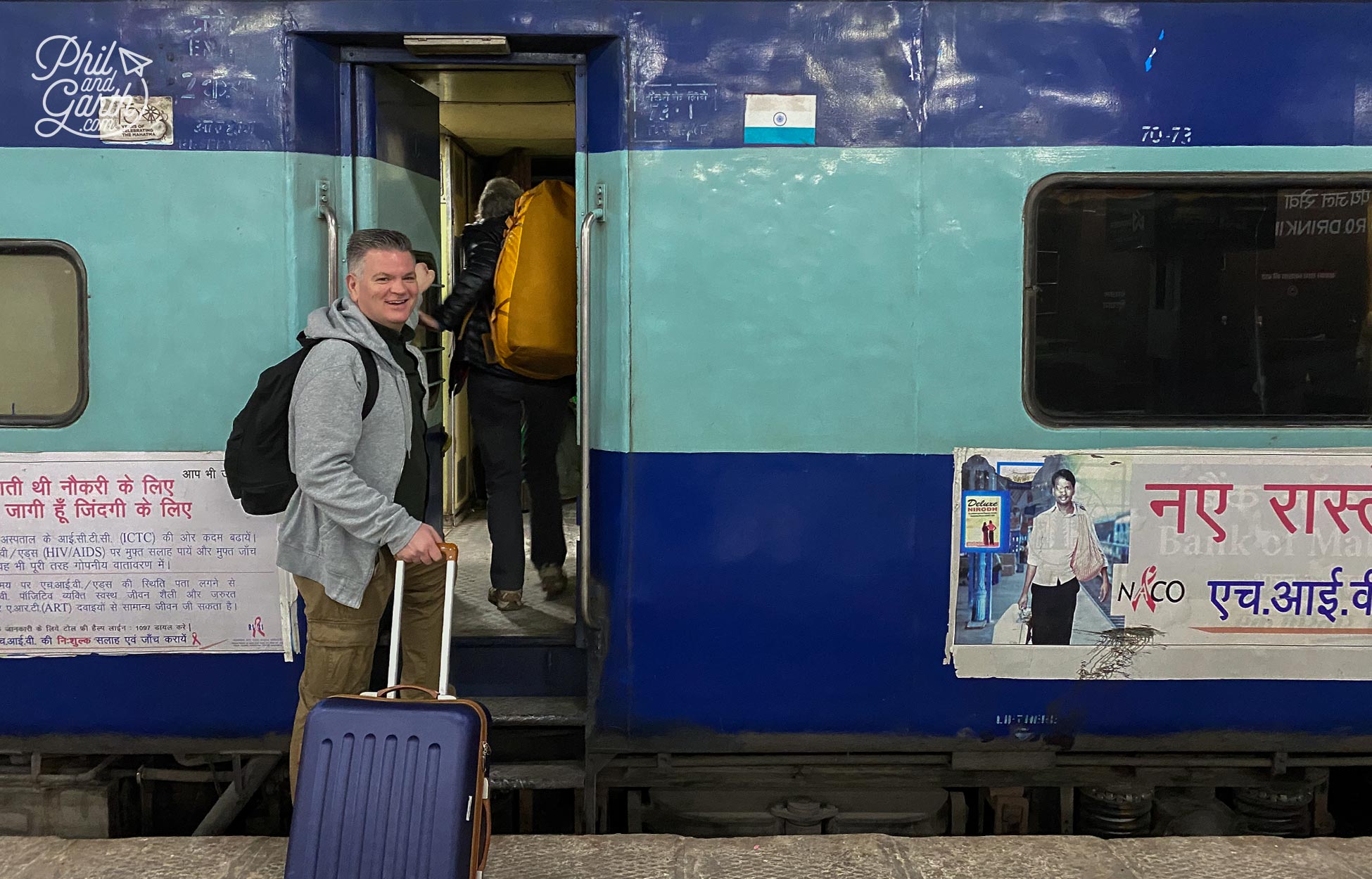
Woo hoo! we’re off on our first sleeper train in India
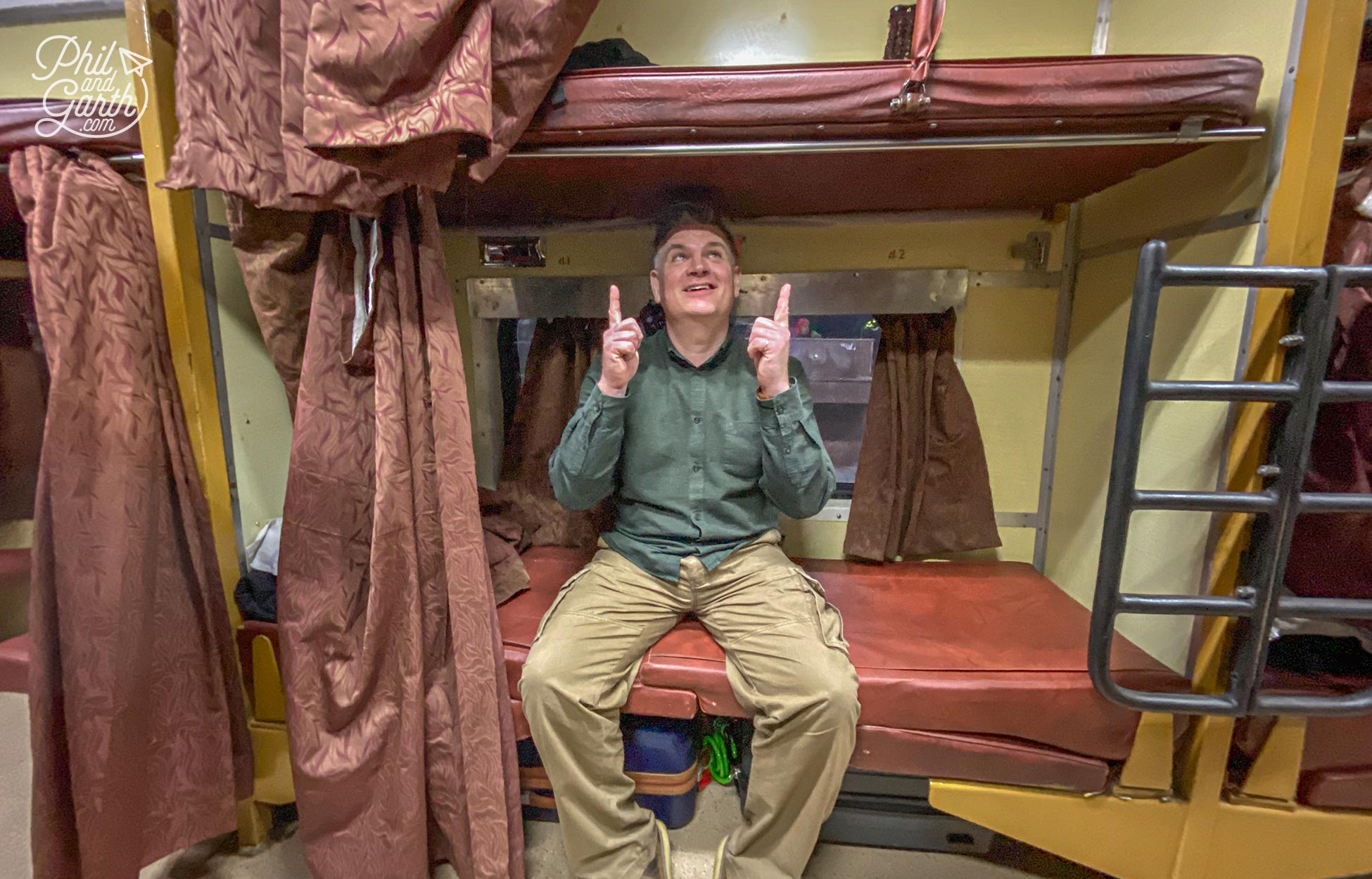
Phil’s in the top bunk for our first sleeper train journey to Udaipur
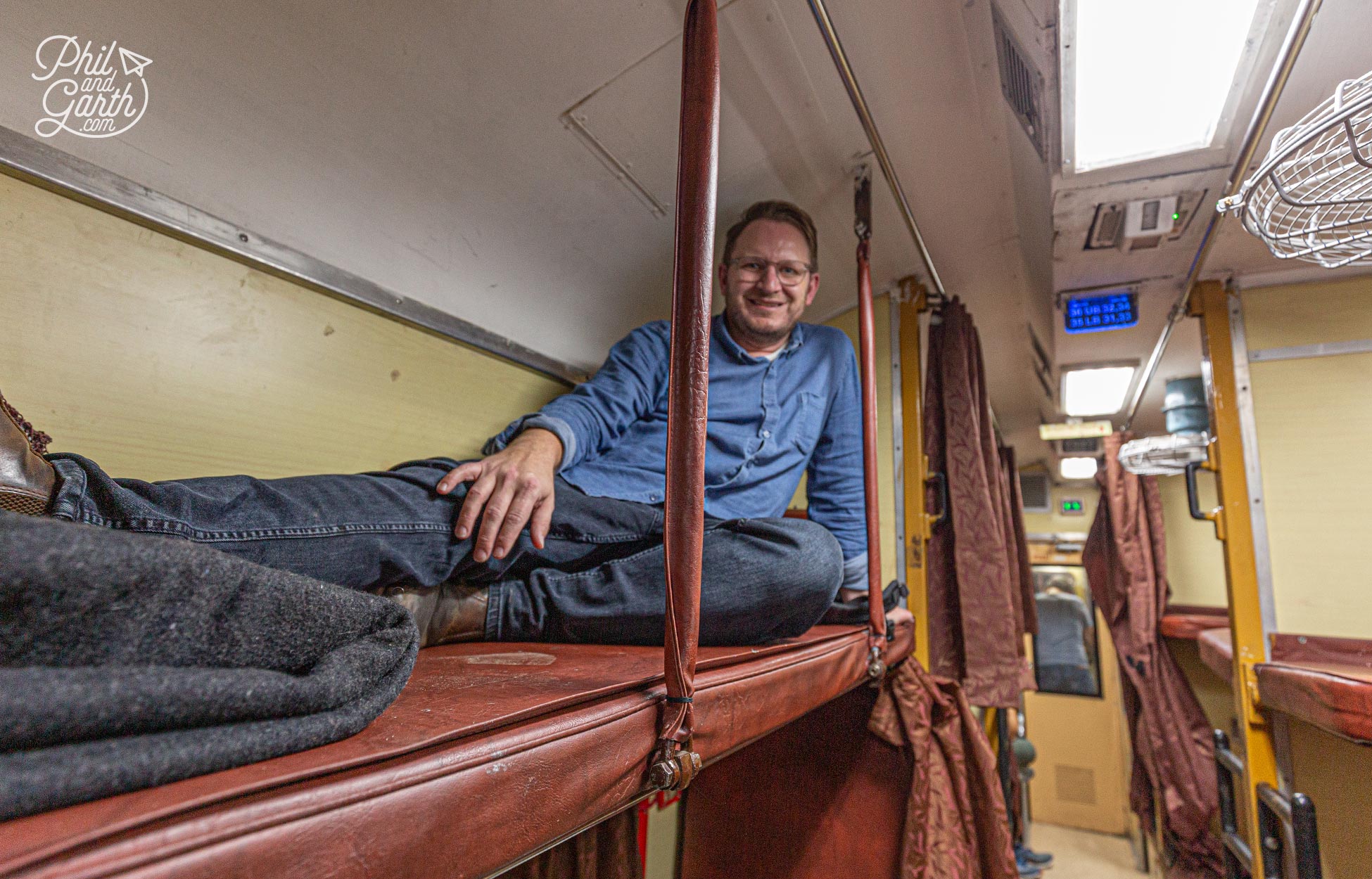
Garth also had a top bunk in the corridor
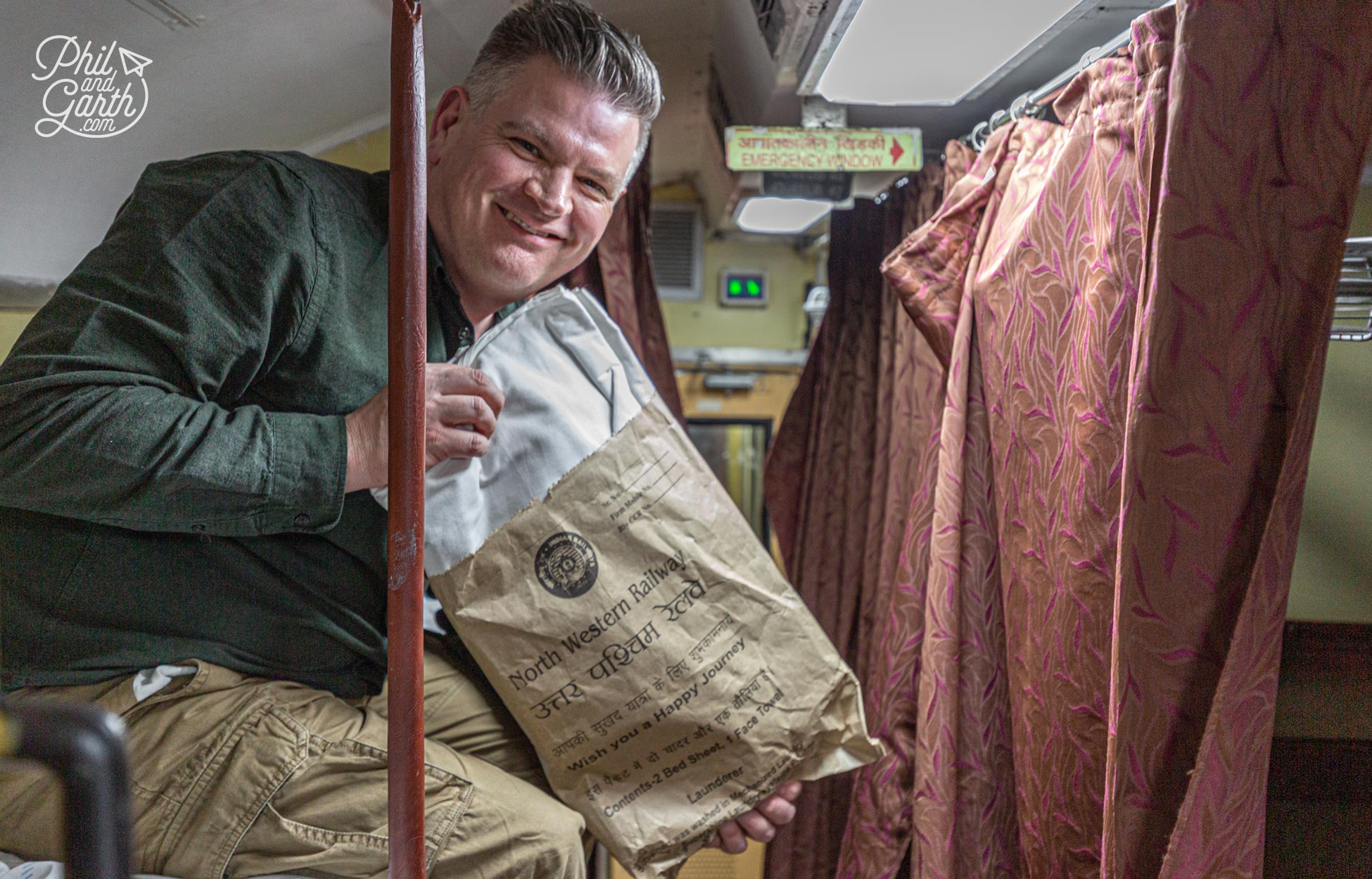
A fresh clean bed sheet, blanket and pillow are provided in AC2 and AC3 classes
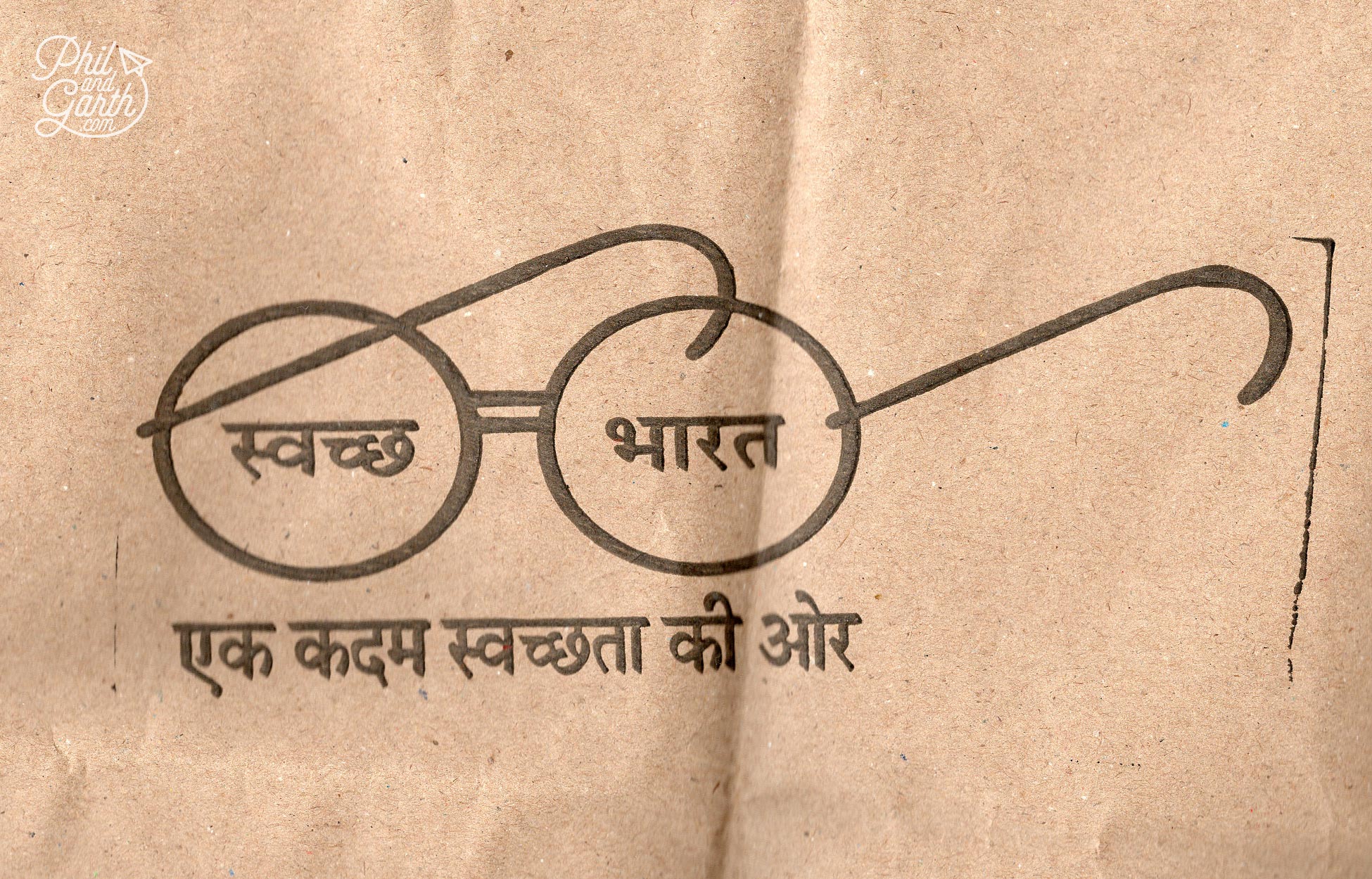
Gandhi’s famous round glasses are printed on the back of the blankets sleeve – wonder what it says?
We Got Off At The Wrong Station!
It’s a good idea to prepare in advance getting off the train. Unlock the padlock from your cases and stand in the vestibules ready to get off. We got off the train and waited for other members of our group to join us, however nobody did and before we knew it the train had pulled off! Doh! No idea how this happened but we got off the train too early! Luckily it was just one stop before of our final destination of Udaipur.
Garth told Phil not to panic and we phoned our tour leader Pema, who told us to get into a tuk tuk and head to the hotel. We actually arrived first at the hotel before the rest of our group! It pays to check the name of the railway stations in advance as some stations still use the old British names or don’t use the name of the city.
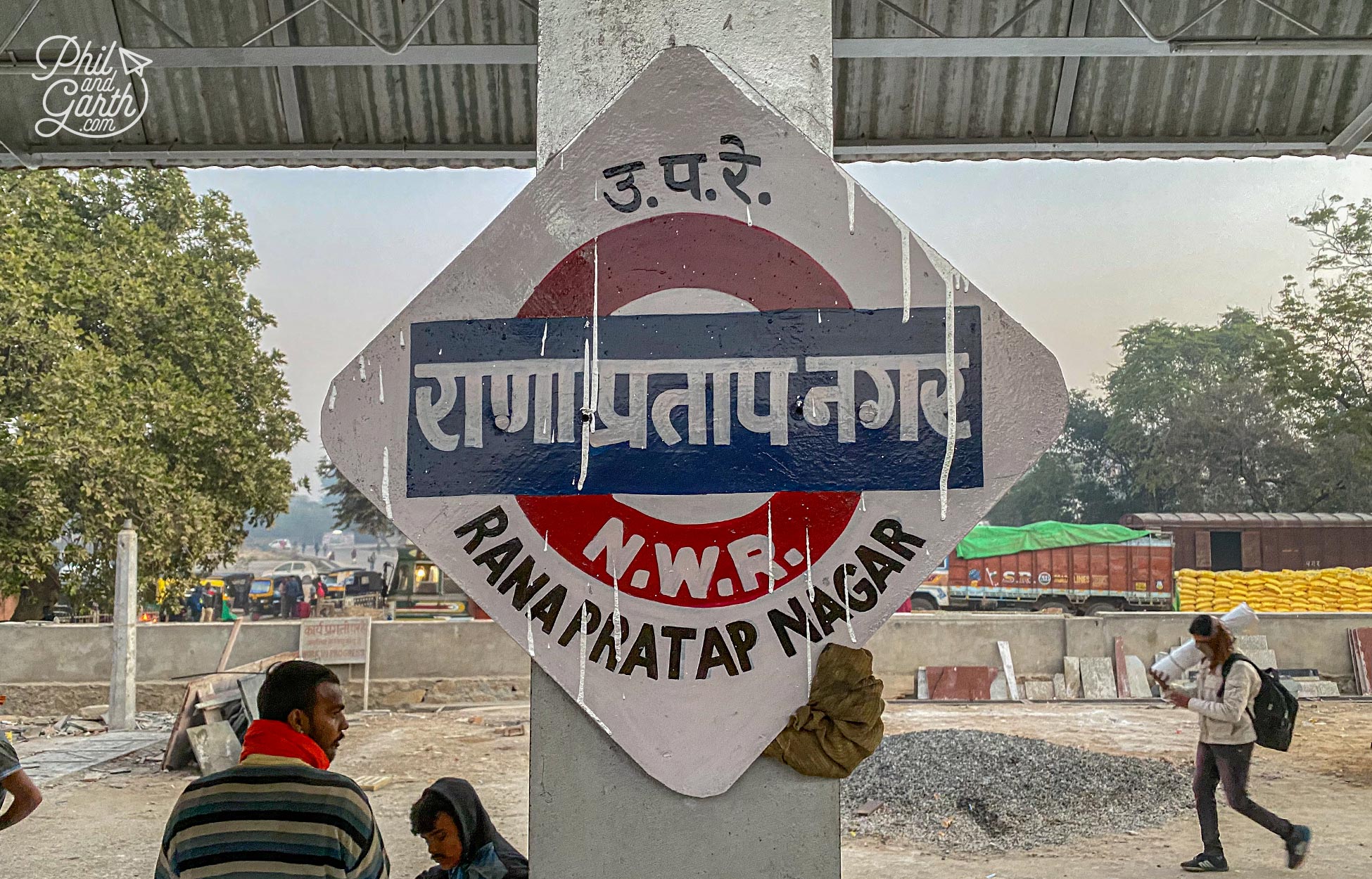
We got off here by mistake! This is not Udaipur.
Udaipur to Ajmer (Pushkar) – Morning Train
Our next train experience was a daytime journey from Udaipur to Ajmer, where we transferred to Pushkar by Jeep. We sat in a ‘Chair Class’ air conditioned carriage which was nice and comfortable. On arrival in Amjer we saw loads of pigs wandering around on the tracks!
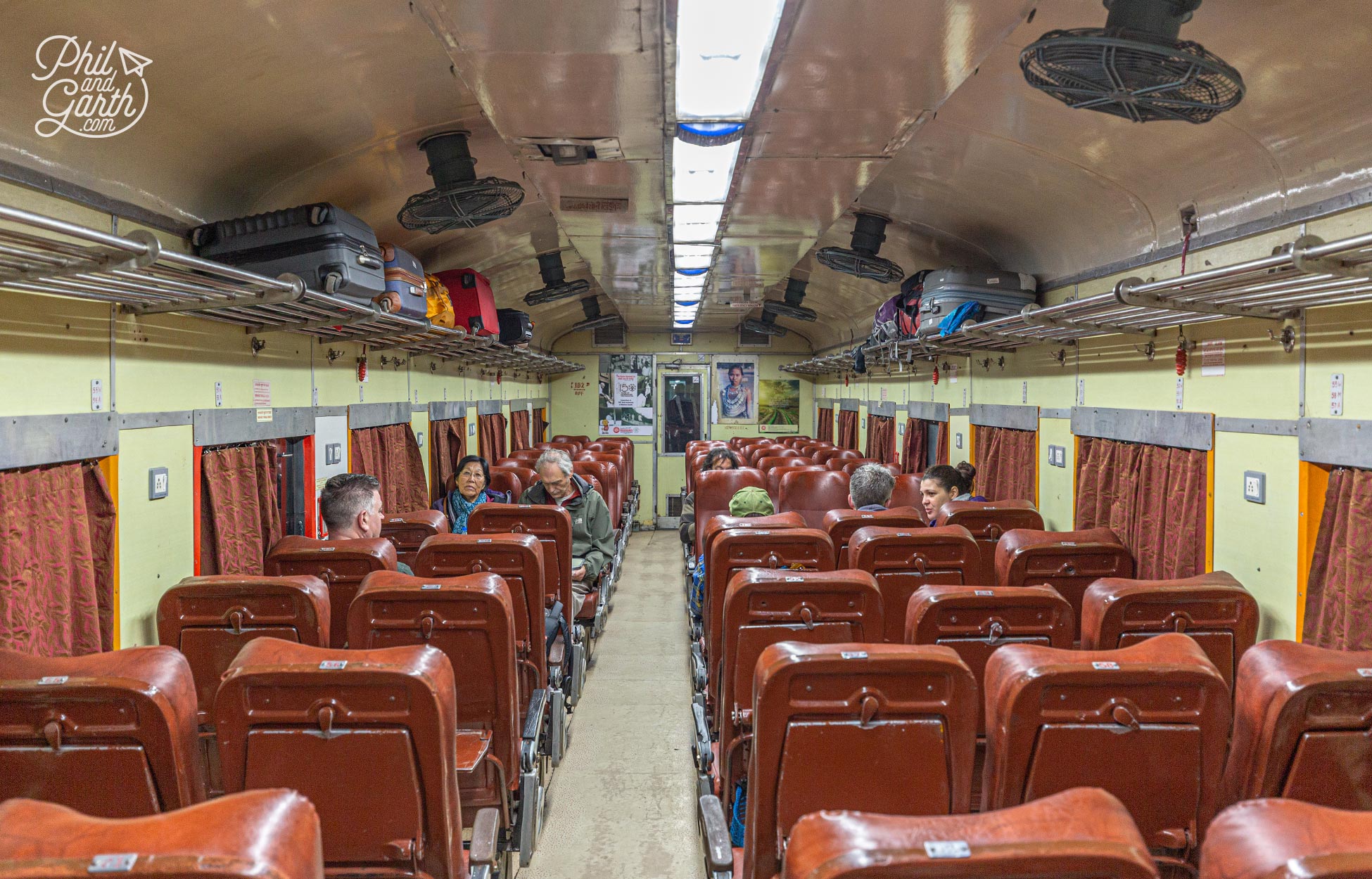
Our air conditioned chair-class carriage from Udaipur to Ajmer
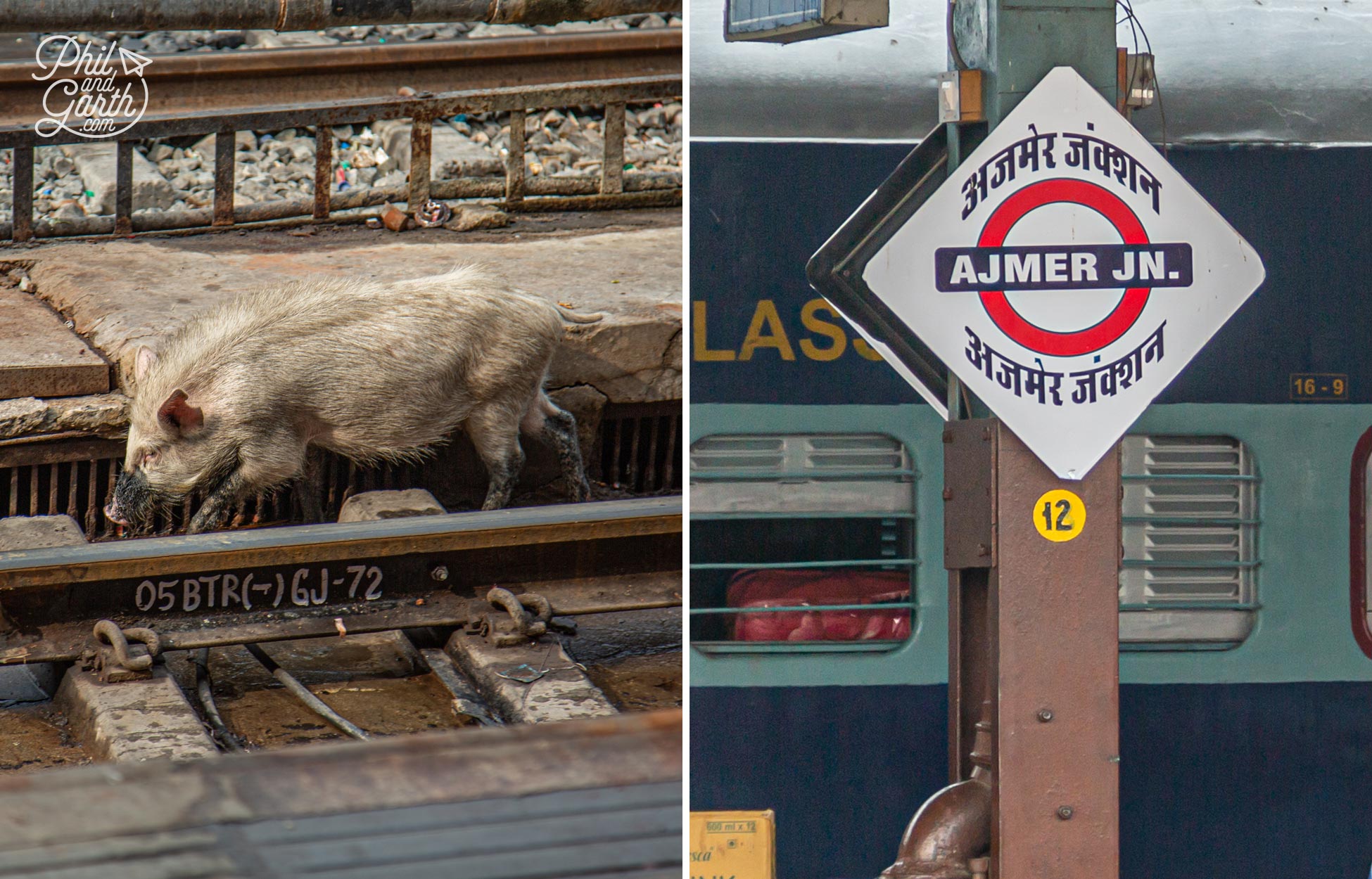
Pigs wandering around the Ajmer train tracks
Jaipur to Agra – Early Morning Sleeper Train
We caught a very early morning sleeper train from Jaipur to Agra with a journey time of 4 hours. Our carriage was much busier because it was AC3 class. People were already sleeping when we got on and there was no space for our suitcases. So we padlocked them further down the train carriage. The sleeping space was very cramped, bunk beds are in 3 tiers and a little claustrophobic at times. There was zero privacy as there’s no curtains in AC3 class.
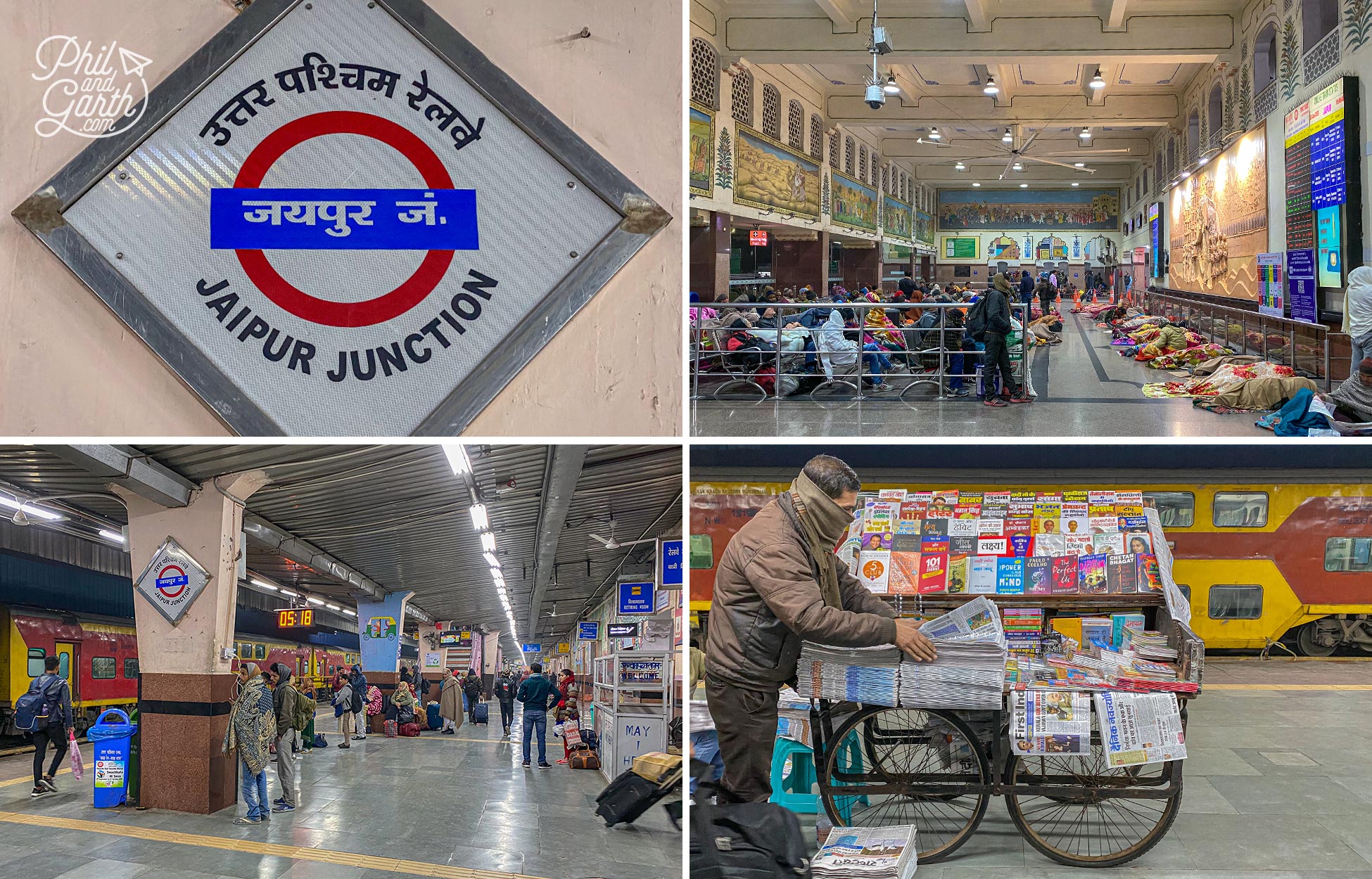
Jaipur Junction railway station
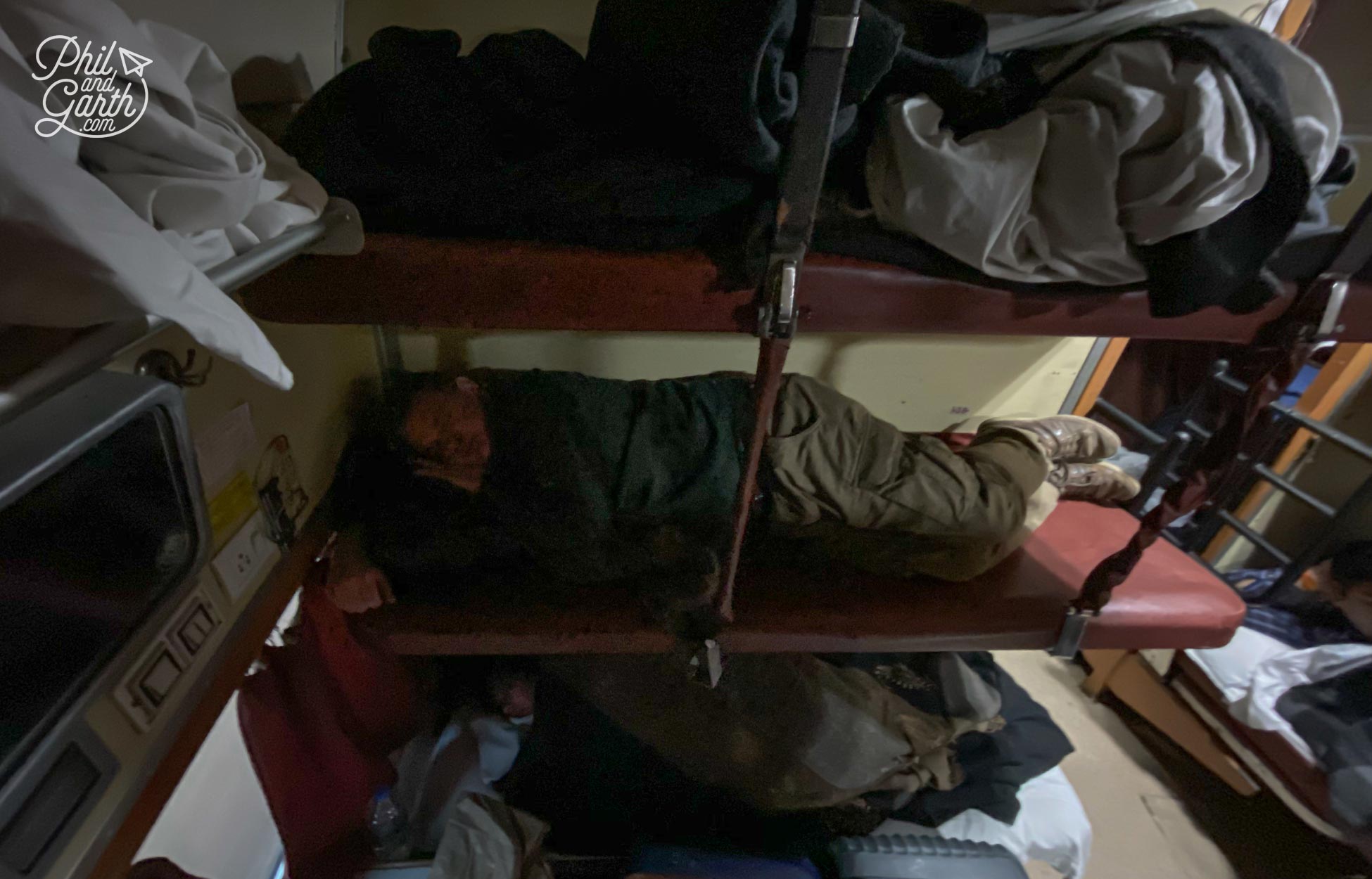
Phil asleep on an AC3 sleeper train from Jaipur to Agra Cantt
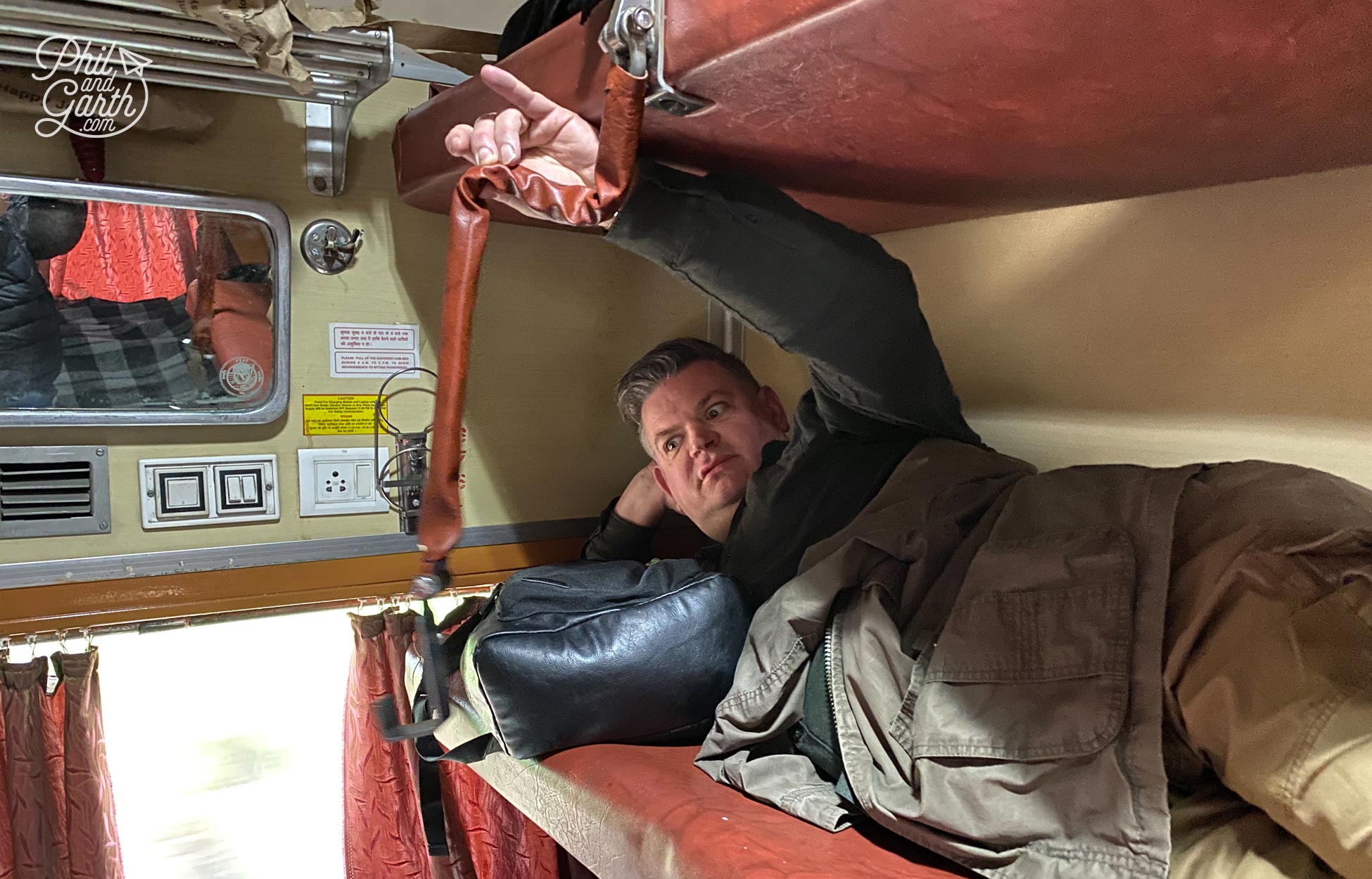
Phil wakes up to find his bed support wasn’t attached!
Agra to Allahabad – Overnight Sleeper Train
Our second overnight sleeper train was a 10 hour journey from Agra Cantt to Allahabad. As we stood and waited on the platform some older people came right up to us and just stared, very weird. Some other people wanted selfies with us, so that passed some time. By now the tannoy woman who continuously announces messages that nobody listens to, just becomes an irritating background noise!
We caught an AC2 class train (the ones with curtains and 2 tiers). This time we slept really well! we put it down to the super early start we had that day to see the Taj Mahal at sunrise.
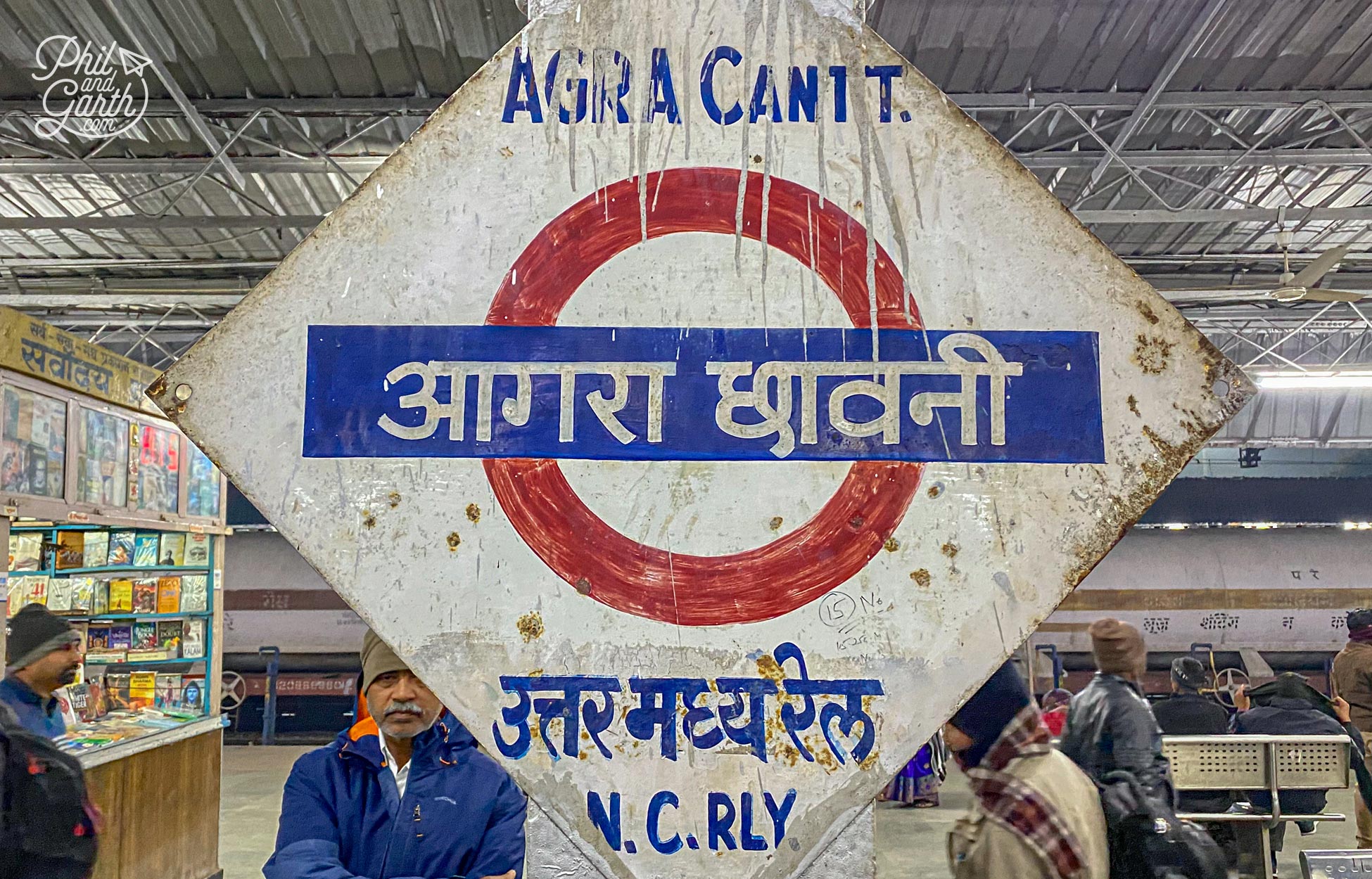
We’ve arrived at Agra Cantt railway station
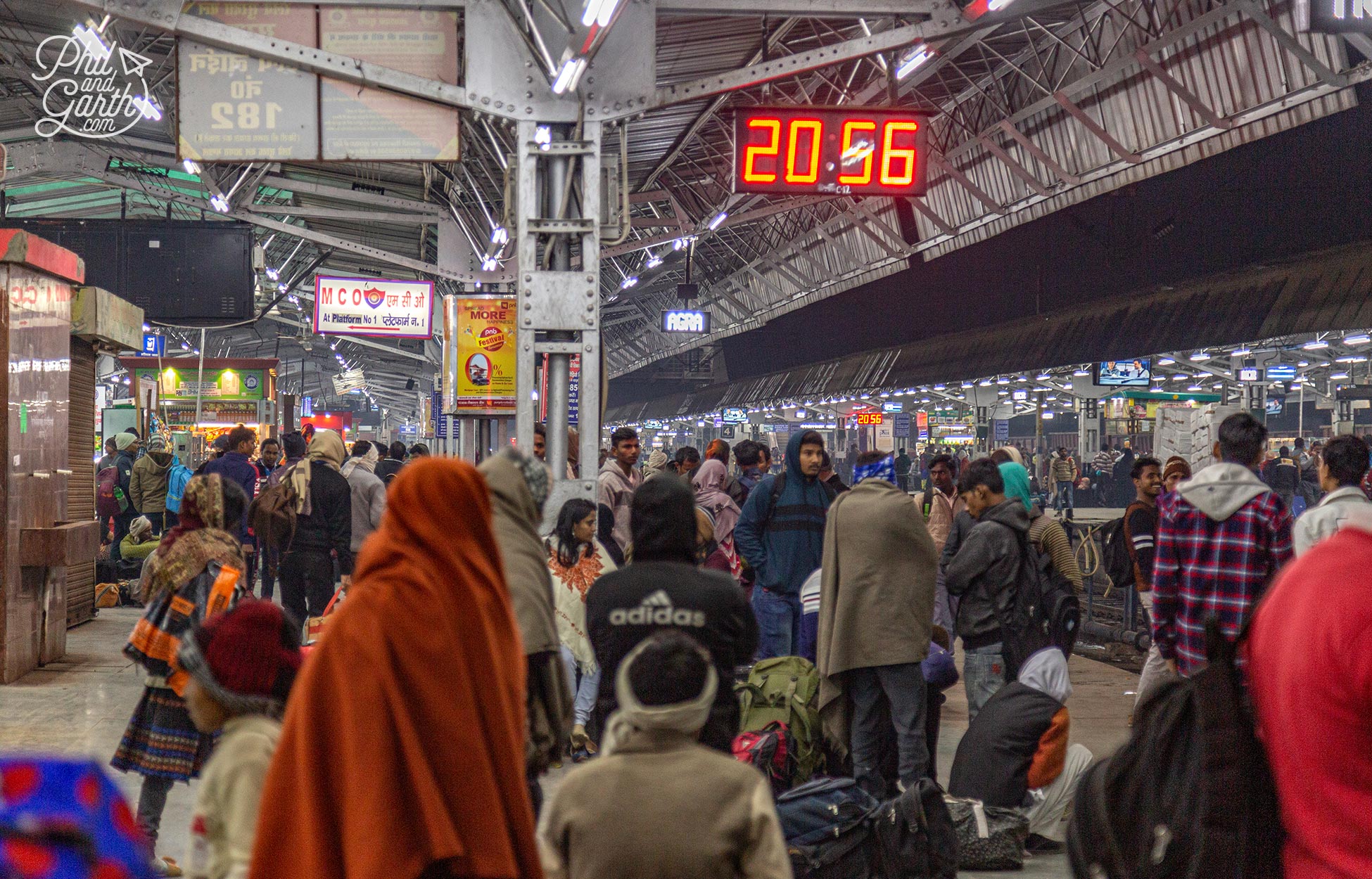
Waiting for our sleeper train on the platform at Agra Cantt station
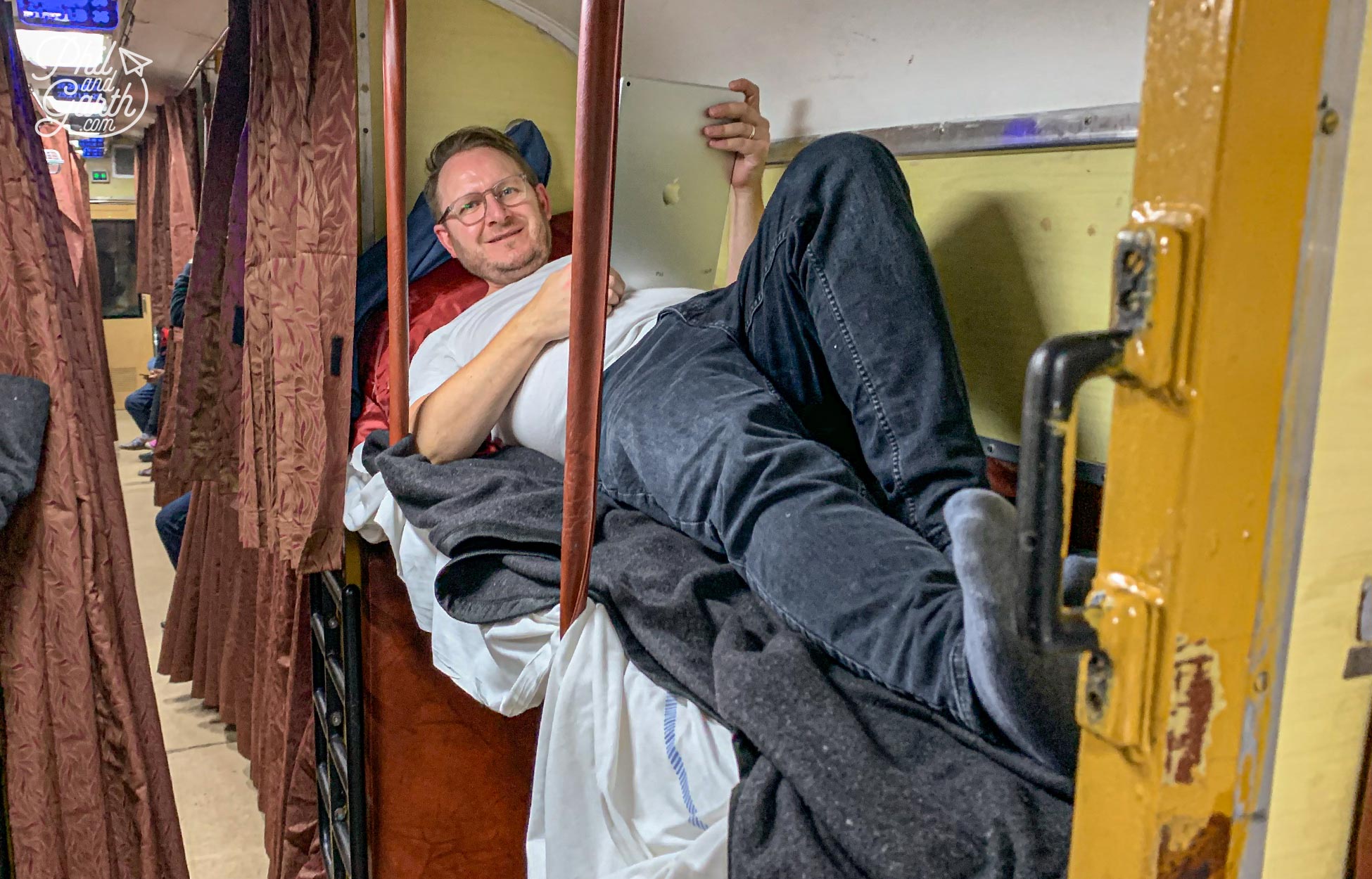
Garth passing the time onboard with his iPad before sleeping
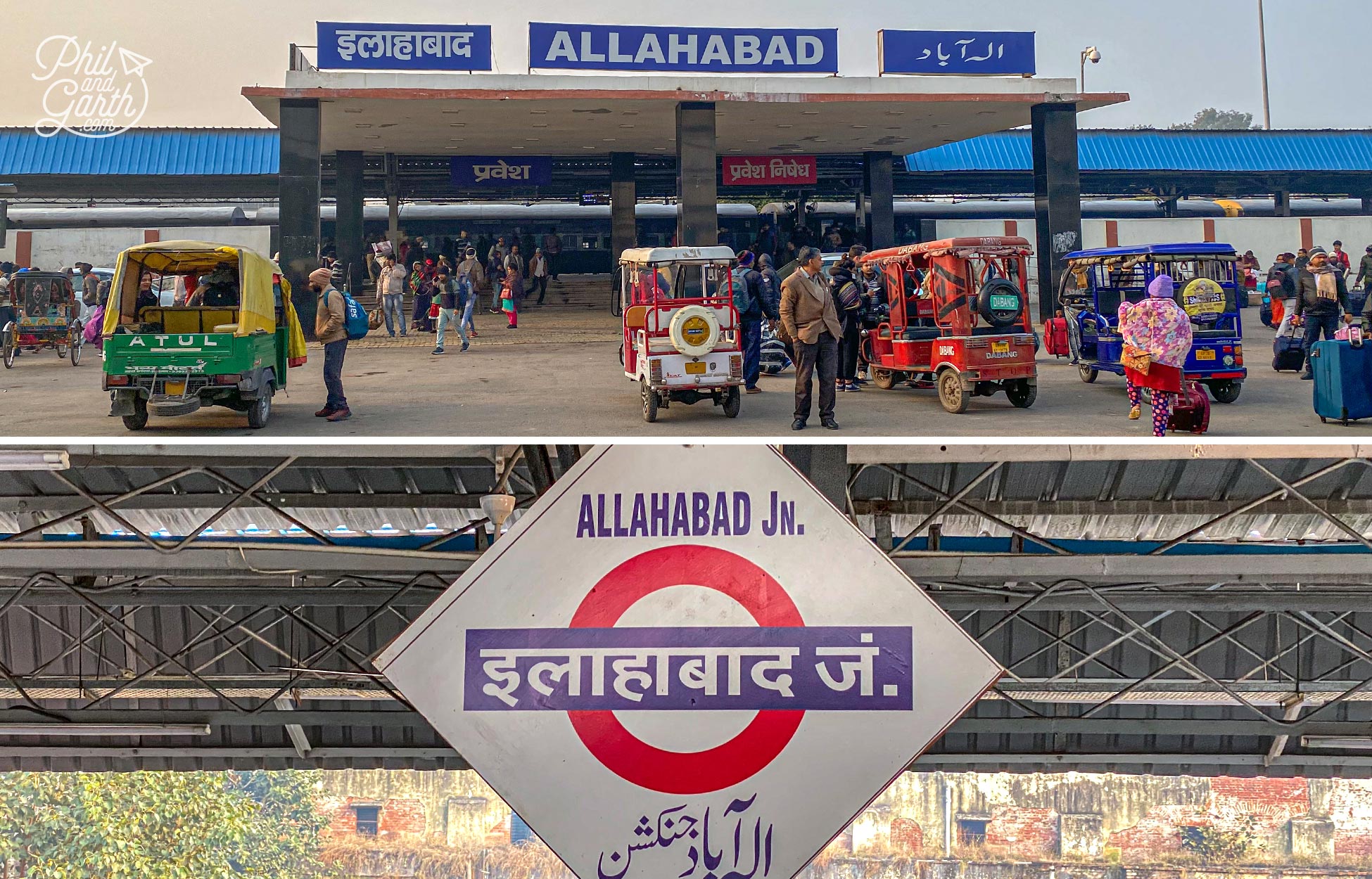
The next morning at Allahabad’s Railway Station
Varanasi To Kolkata – Our Last Sleeper Train
We had reached the end of our tour of India with just one more overnight sleeper train from Varanasi to Kolkata to go. Varanasi’s train station platforms felt much dirtier than others we had experienced. Even thought it was winter there were lots of mosquitoes and we saw a rat on the tracks. To pass the time and keep warm we waited at the indoor waiting room, sharing the space with other people sleeping on the floor.
It was interesting to see so many people carrying large and small plastic bottles. They contain holy water collected from the River Ganges. Many Hindus like to take the water home to give to family and friends who are not able to visit Varanasi.
The 15 hour journey was a nightmare. A screaming baby, lots of people snoring loudly and mobile phones constantly ringing throughout the night, so we didn’t get much sleep. We were surprised at how many people hold full volume conversations on their phones at anytime – so take your ear plugs!
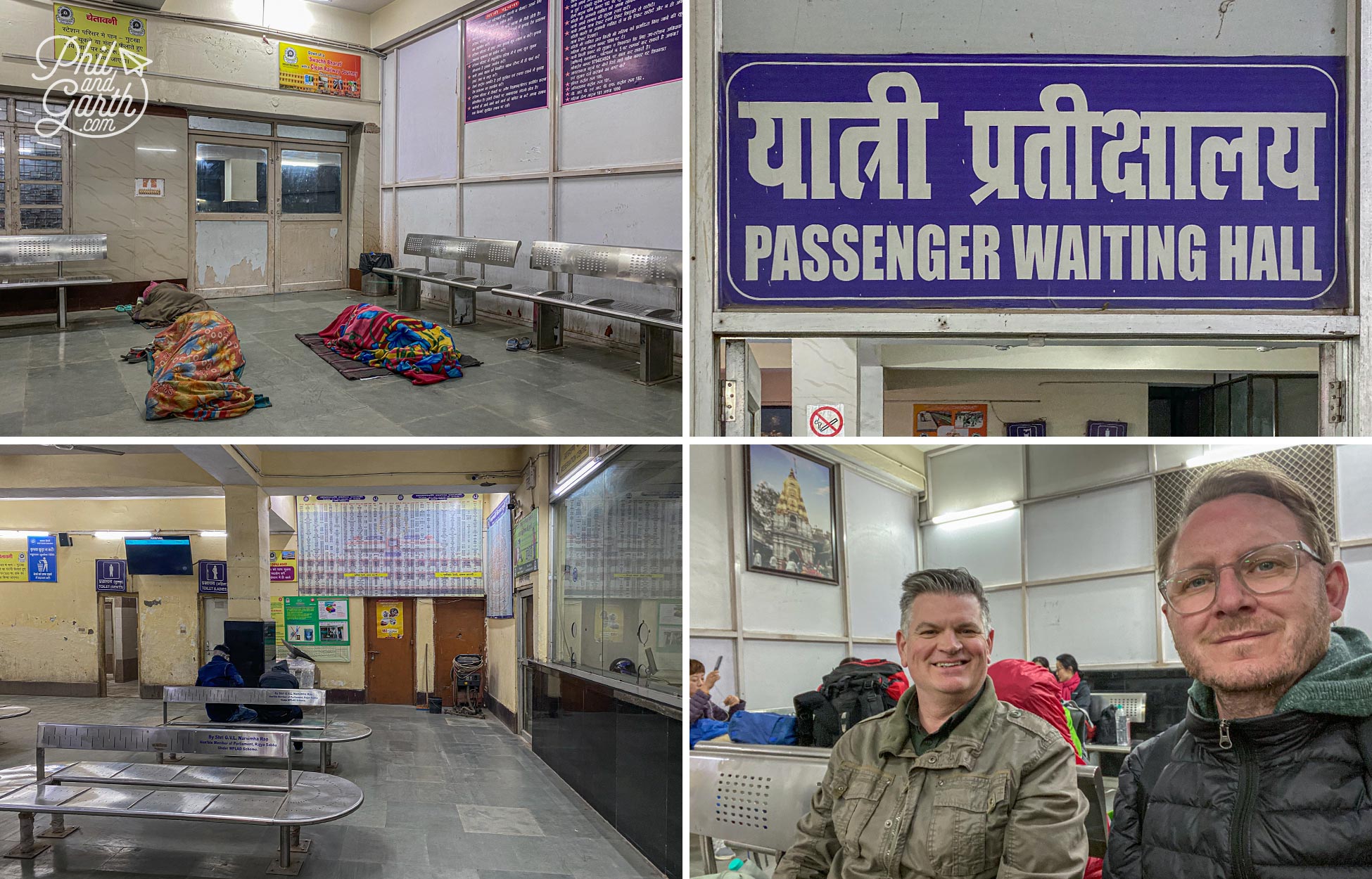
Waiting at Varanasi for the sleeper train to Kolkata
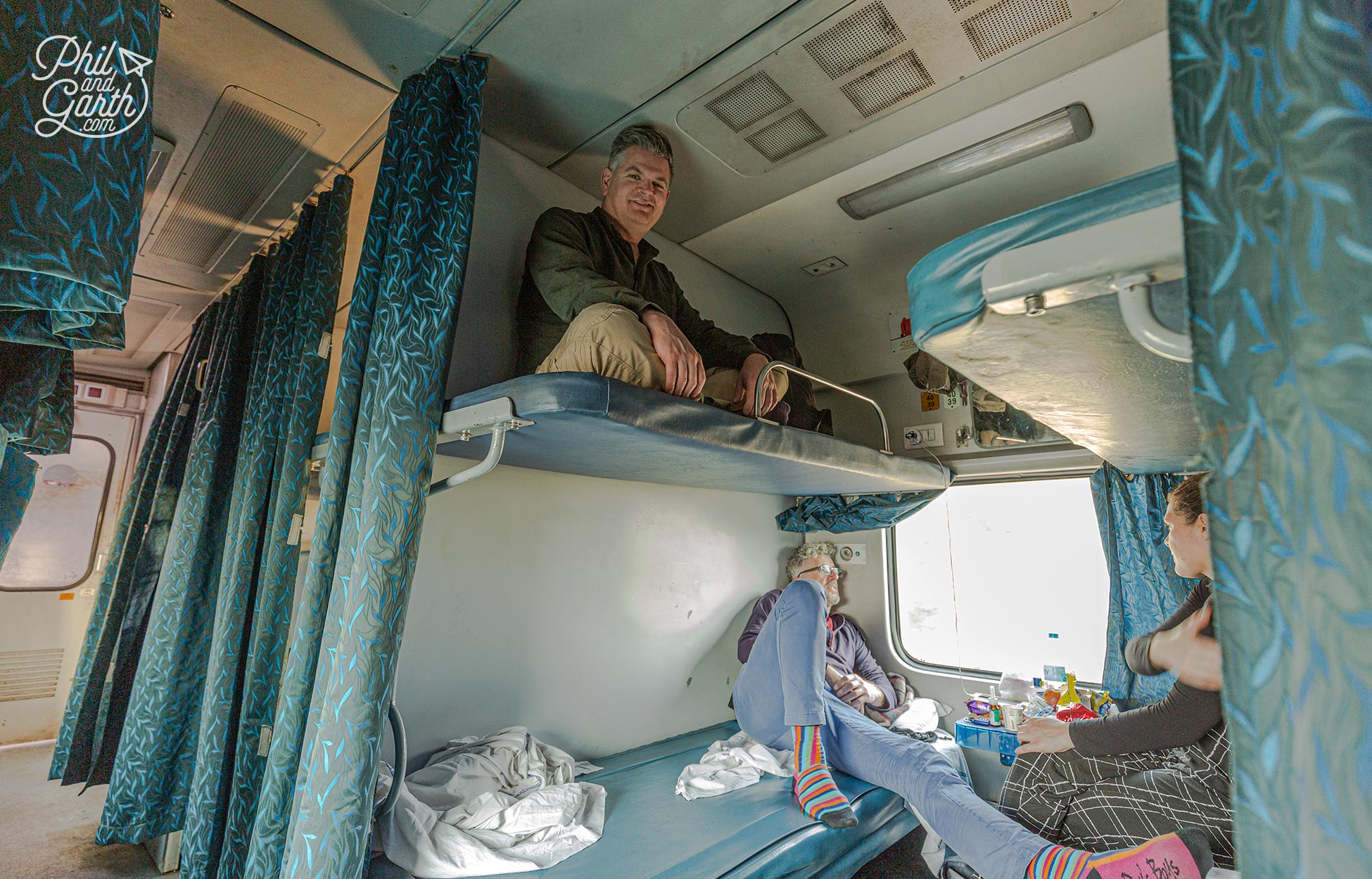
The morning after the horrific night before!
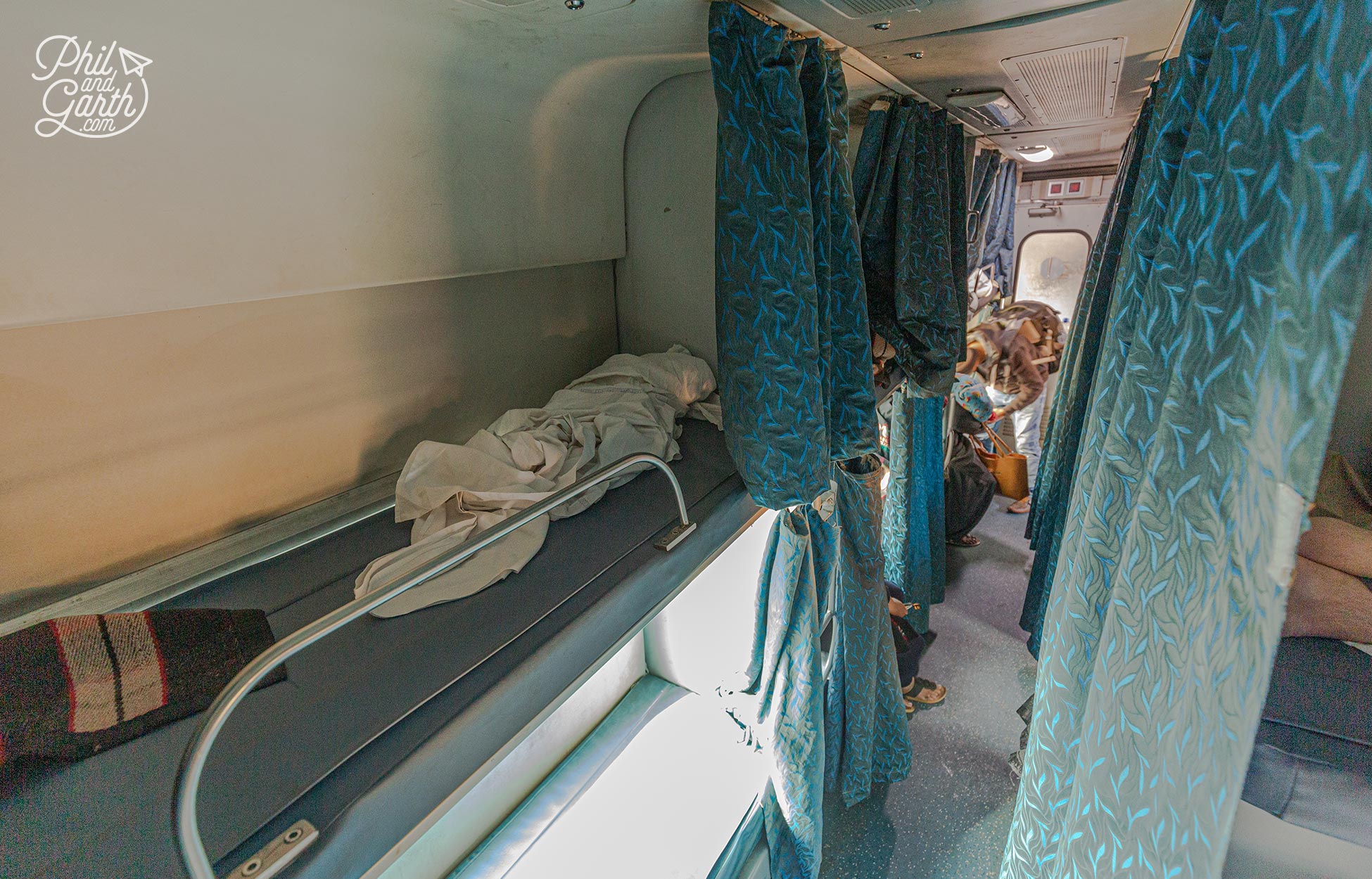
Garth got the top bunk on the corridor again
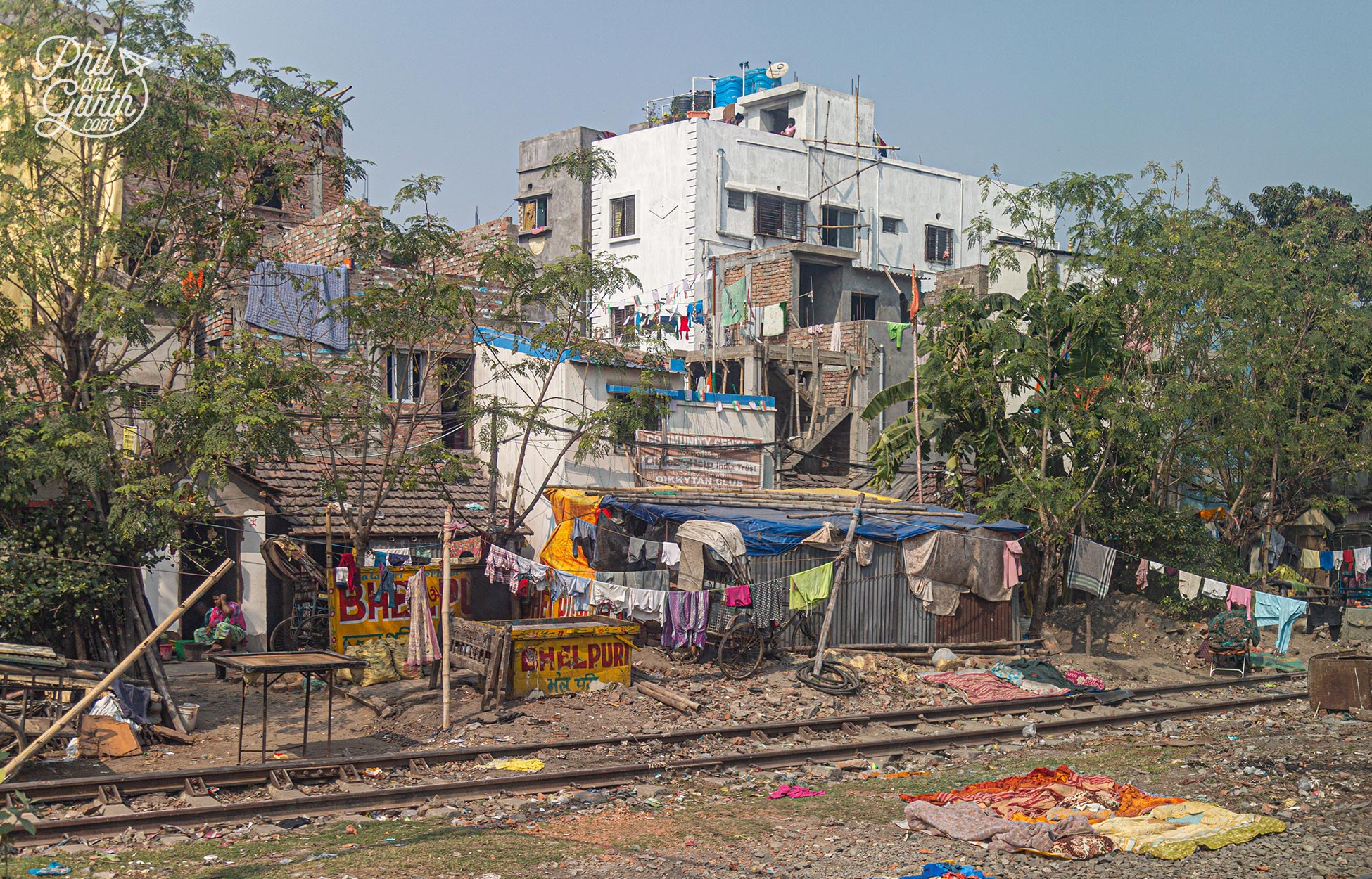
Views out of the window as we arrive approach Kolkata. Many poor people live right on the tracks
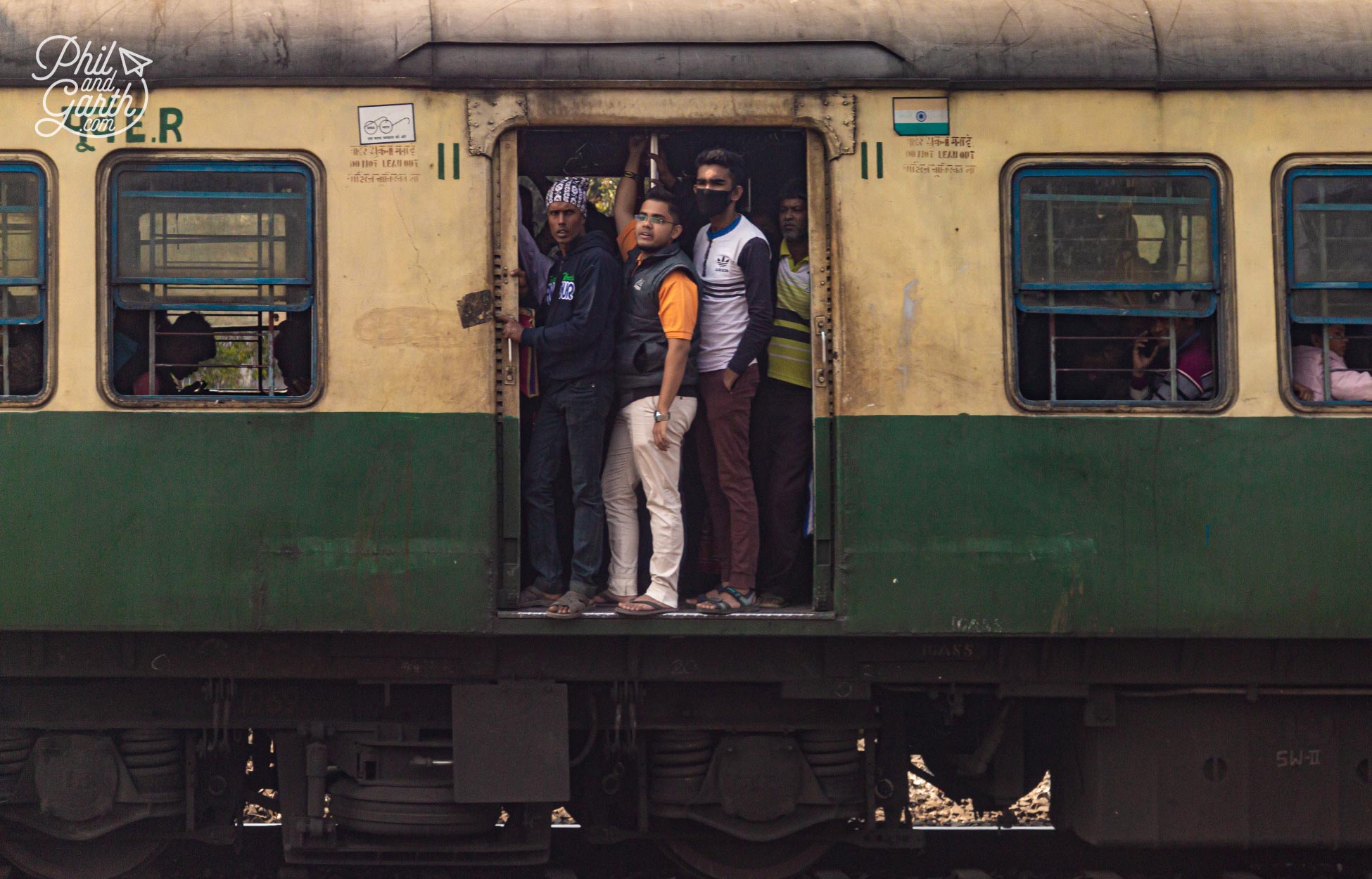
A commuter train into Kolkata – the closet sight we saw to people hanging out of trains
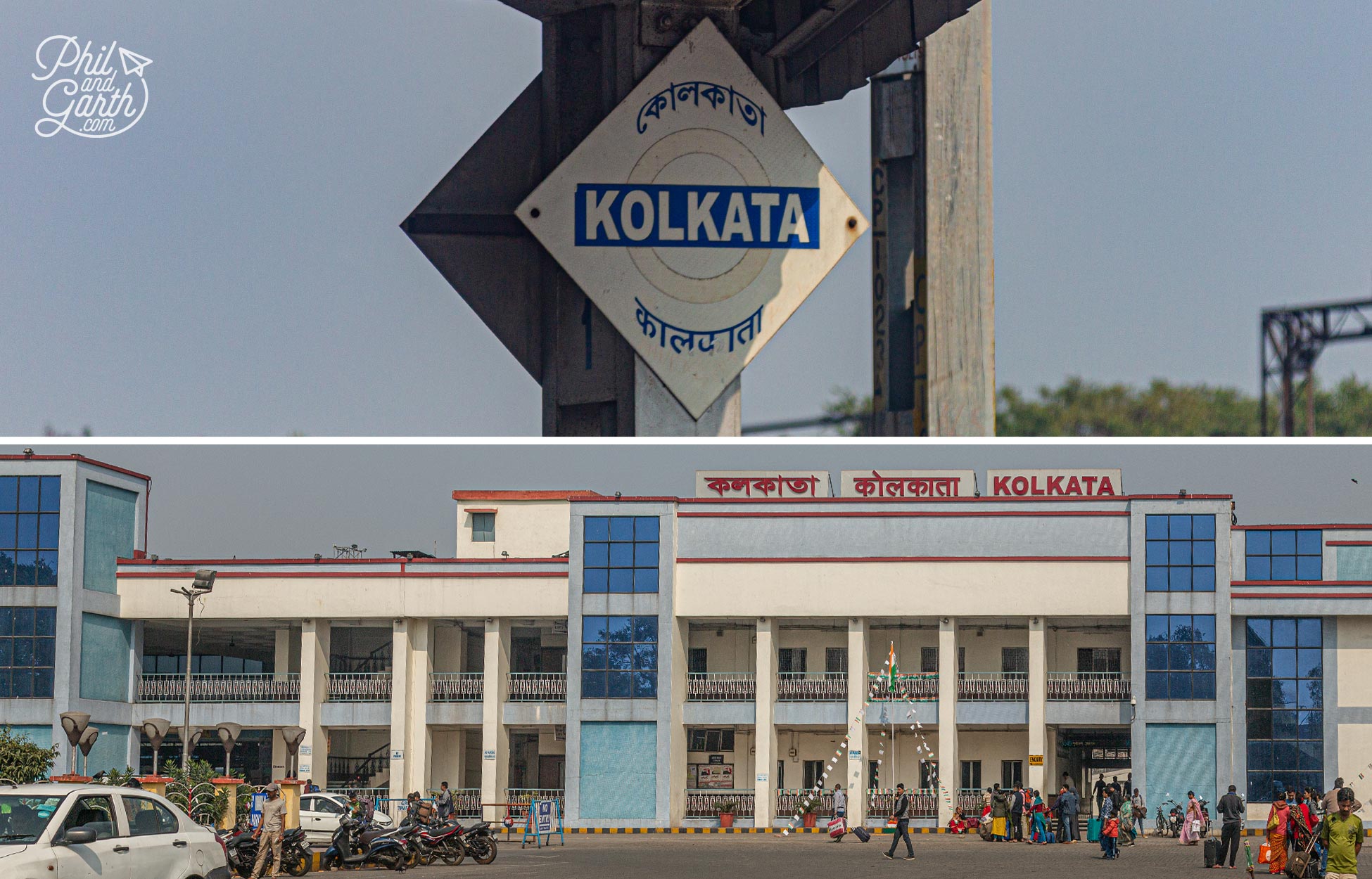
Our final destination – Kolkata Railway Station
Indian Sleeper Trains Practical Information & Advice
Lock Your Luggage
Don’t take huge suitcases as they won’t fit under the bunks (or even in tuk tuks). Our hardshell suitcases were the perfect size – H63cm x W42cm x D24cm. It’s safer to always lock up your luggage, look under the seats for the metal rings. If one isn’t available then padlock your cases together. We brought our own bicycle combination lock with us. If you’ve not got one you can purchase a lock and chain at railway stations, however we noticed they weren’t always easily available. We slept with all our valuables in our ruck sacks and put the supplied pillow on top of it, so it felt safe under our heads. Sleep with your head nearest the window too if you’re not on a corridor bunk bed.
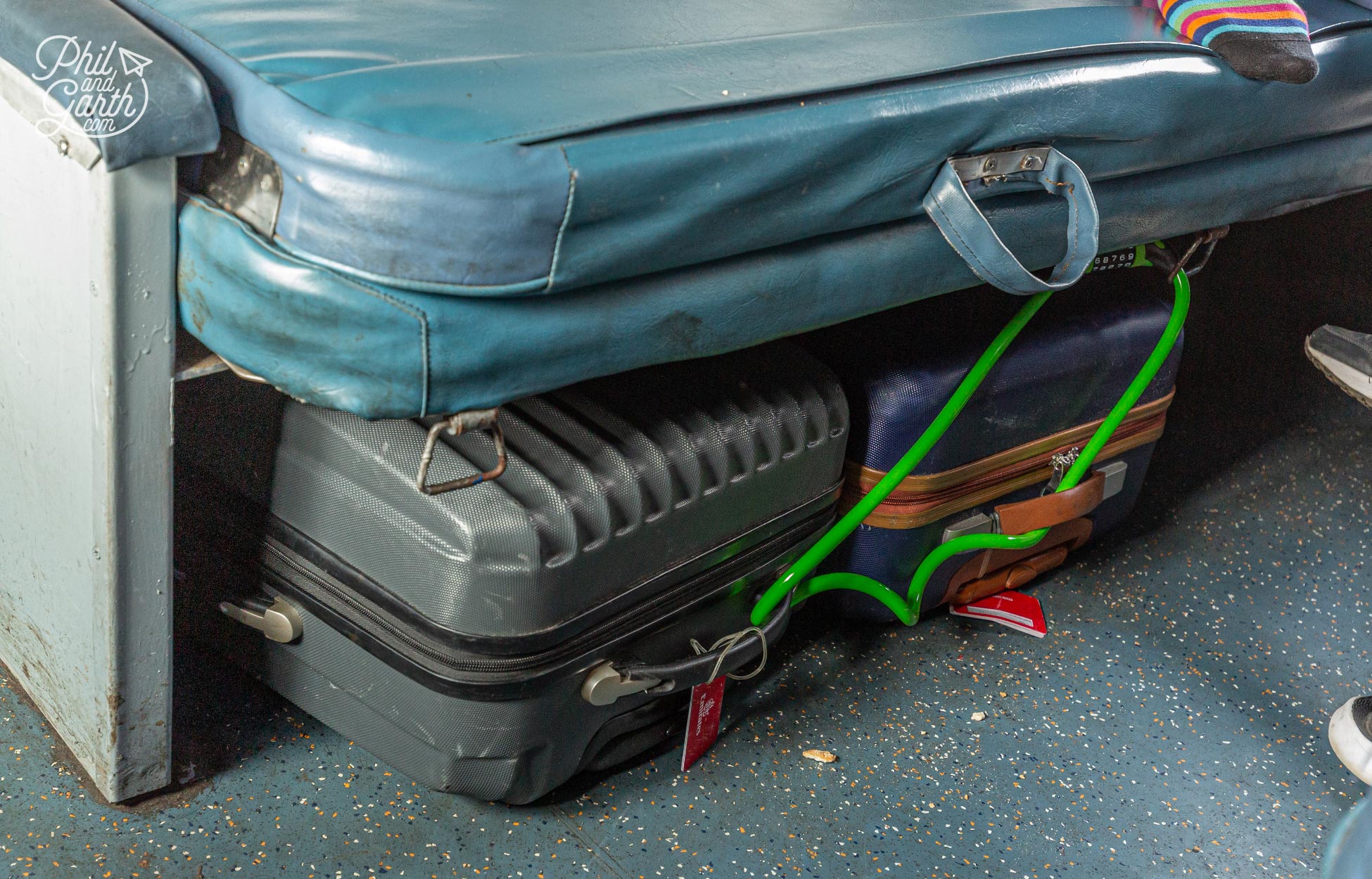
Padlock your suitcases to the metal rings underneath your seat/bed on sleeper trains
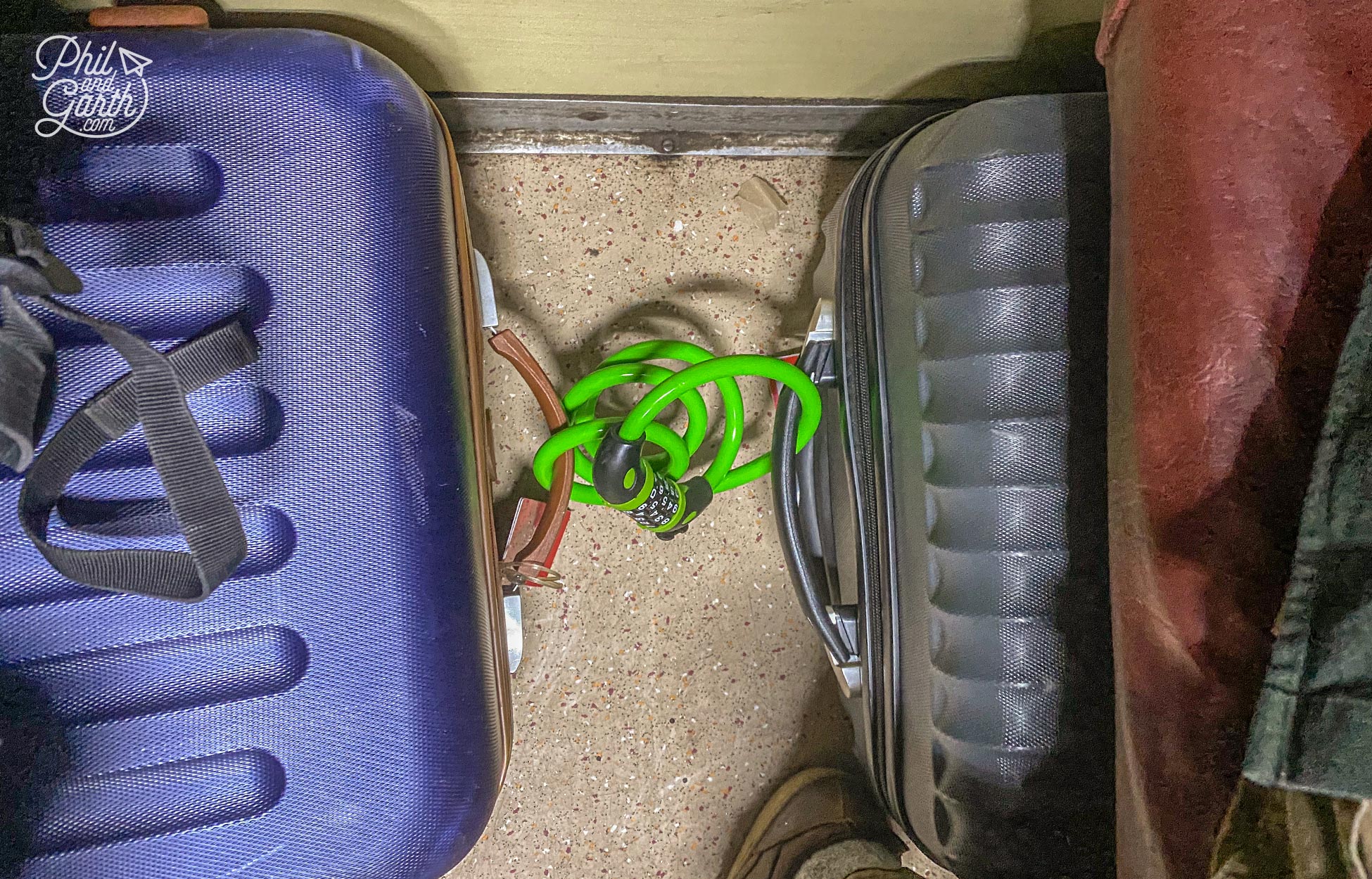
Or if there is no ring padlock them together under the seats
Food & Drink on Sleeper Trains
There’s no restaurant carriages on Indian sleeper trains, instead staff pace up and down carriages at regular intervals selling drinks and food. We had a choice of chai, bottled water, tomato soup, biryani and omelettes in the mornings. The tea wallah is the most regular person chanting “chai, chai”. We only bought chai and packets of crisps, if you want to avoid Delhi Belly don’t buy any of the hot food.
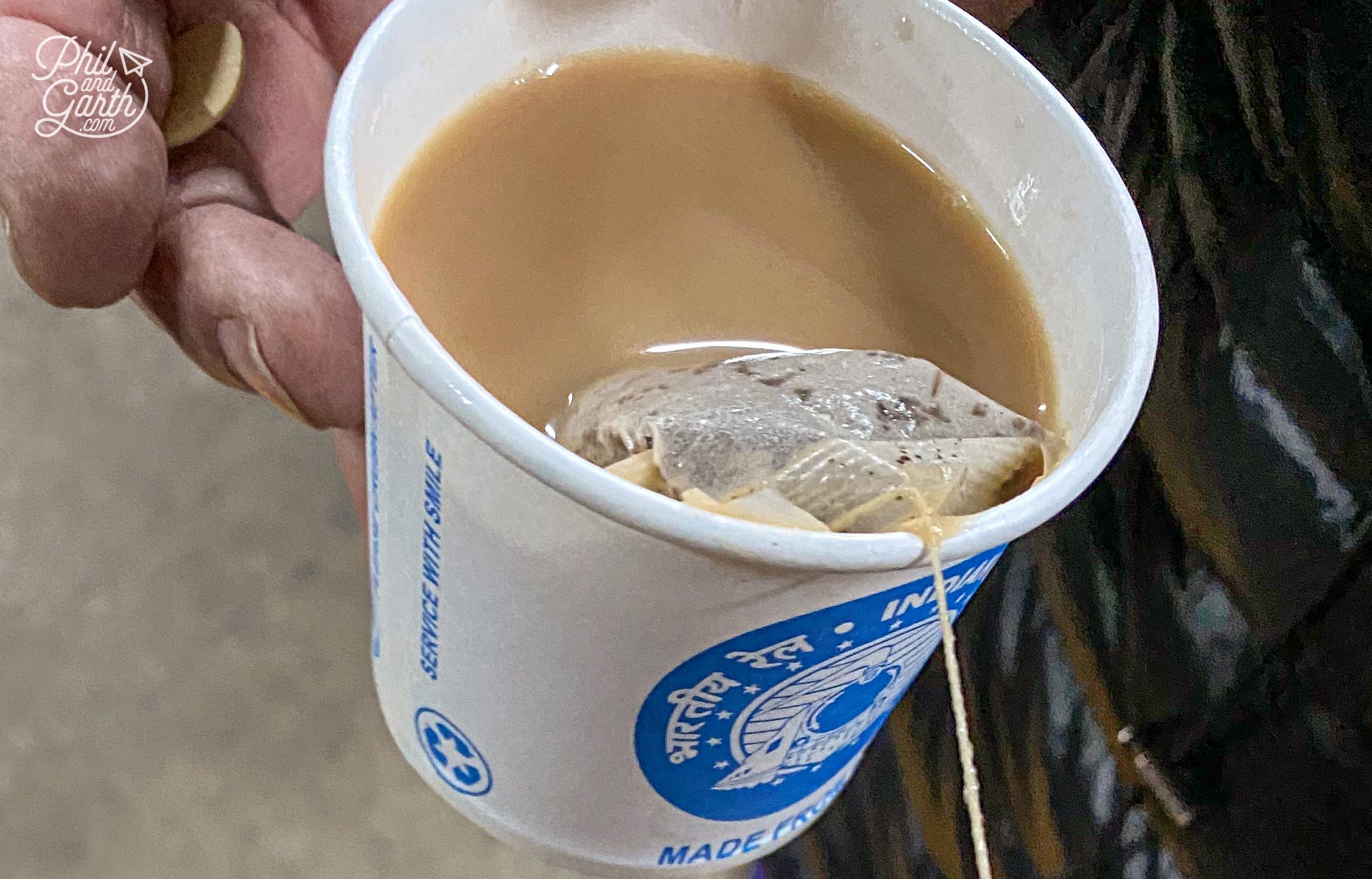
A paper cup of chai – India’s sweet milky tea
The Toilets on India’s Sleeper Trains!
And finally the loos! Well we’re not going to lie the toilets are gross to be honest. At the end of each carriage you have a choice of a squatty potty or a western style toilet, neither are really any better! If you’ve ever been to the Glastonbury music festival, you’ll know THAT smell, it’s just like the sleeper train toilets. They’re not exactly clean, but attendants do hose them regularly so make sure you wear shoes and take your own loo paper and hand sanitiser.
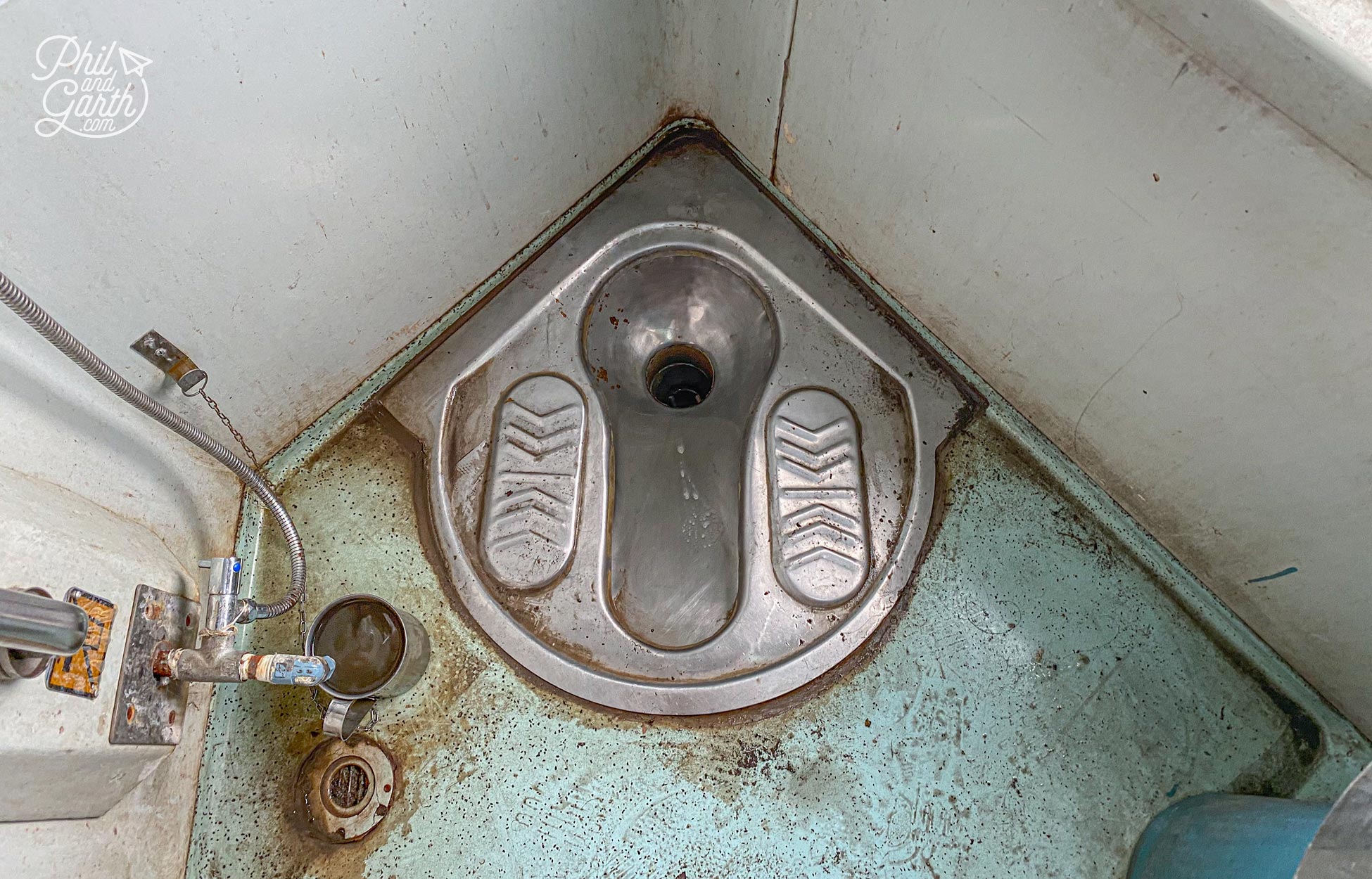
A typical squatty potty from an AC2 sleeper train
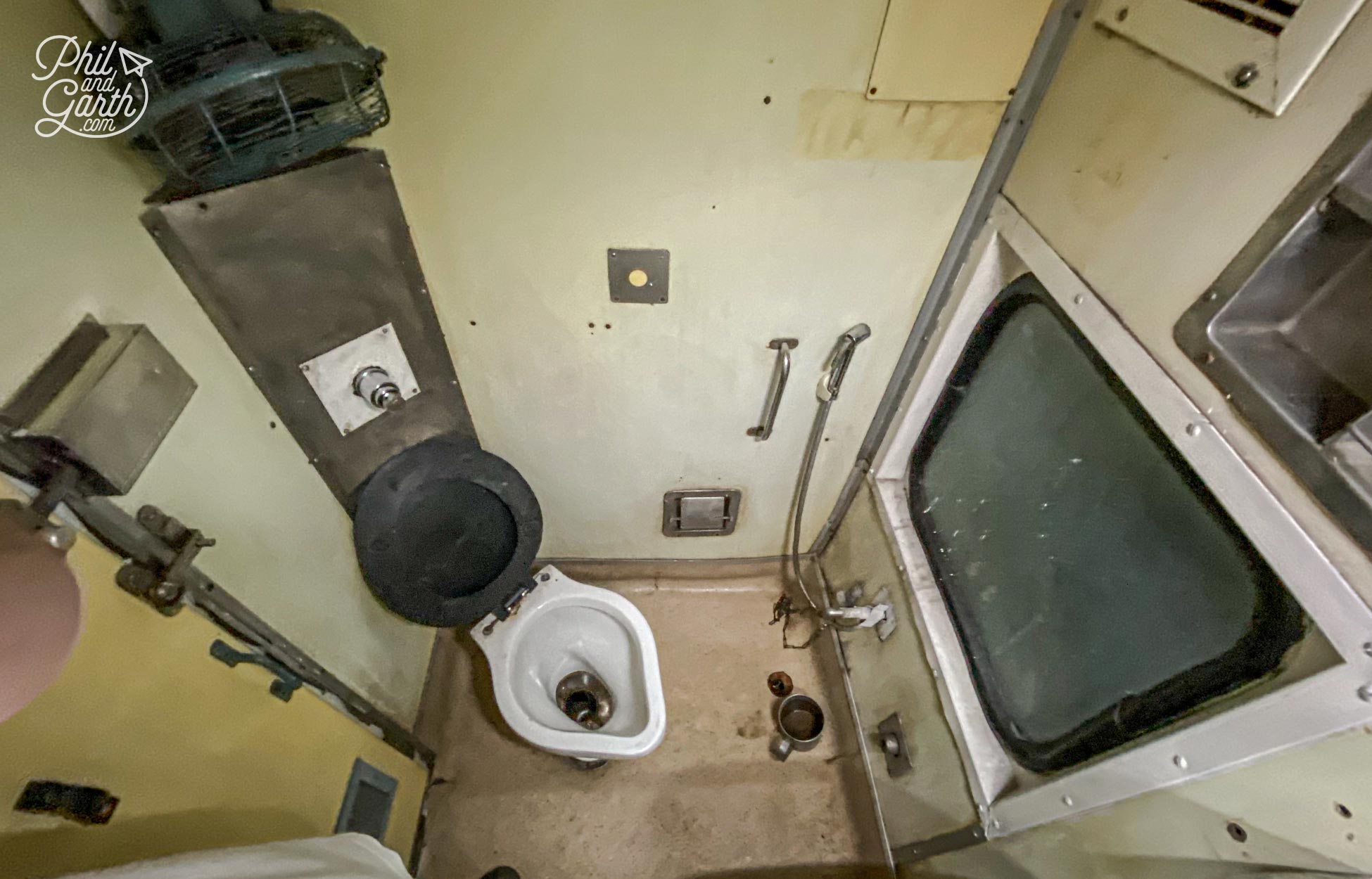
A Western-style toilet – maybe only slightly better than the squatty potty?
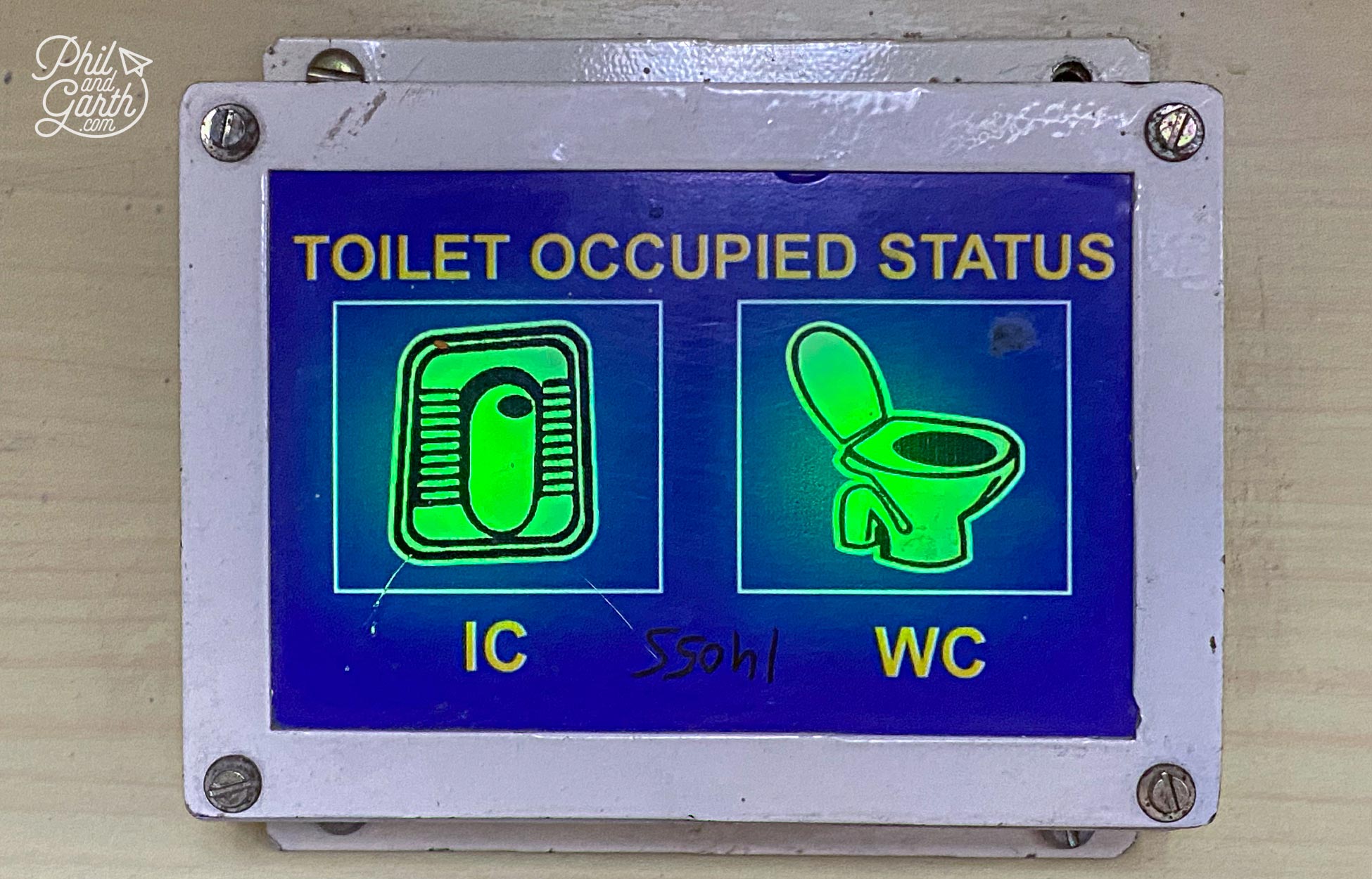
Toilet signs inside the carriages tell you if they are occupied like on an airplane
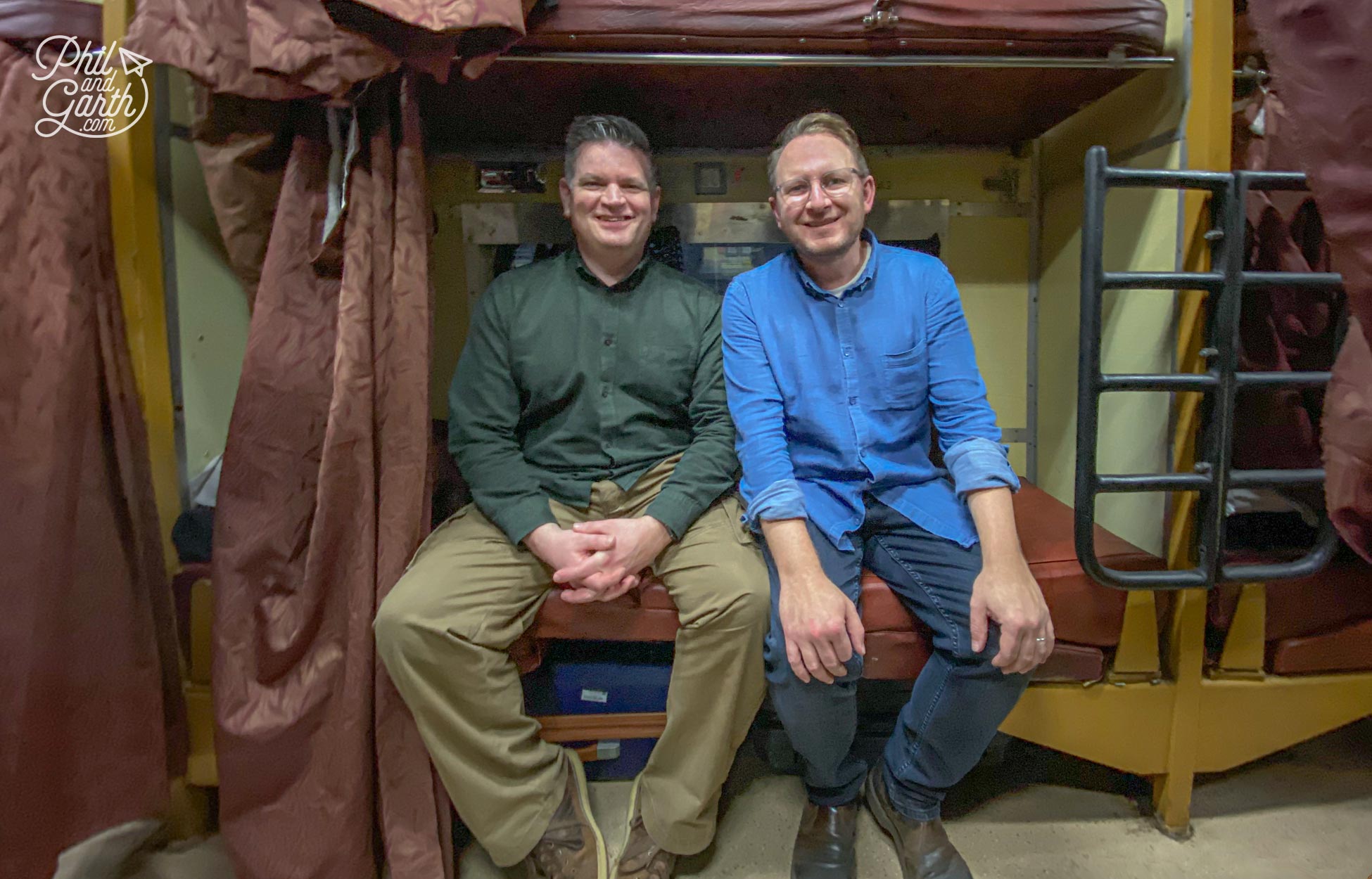
Phil and Garth’s Top 5 Indian Sleeper Train Tips
Phil and Garth’s Top 5 Indian Railways Sleeper Train Tips
- Tip #1: Take 5 essential items – padlock, earplugs, lots of water, hand sanitiser and toilet roll.
- Tip #2: Have a number 2 at your hotel before you reach the train station, or at the station if you have to.
- Tip #3: Everything looks the same when curtains are closed. Tie a ribbon to yours if you need to go pee during the night.
- Tip #4: Charge up and take a power bank for long journeys and delays. Garth was glad he did.
- Tip #5: Be warned the top bunk beds are icy cold because they are right next to the AC outlets.
How We Did It
- We travelled at the end of January on a 21 day tour of India. The weather was cold in the evenings, so you need layers and a warm jacket.
- We paid for a small group escorted tour with Explore who booked and organised all the train tickets. The tour comes with a tour leader, ours was Pema who guided us to the correct platforms and was on hand for any advice we needed.


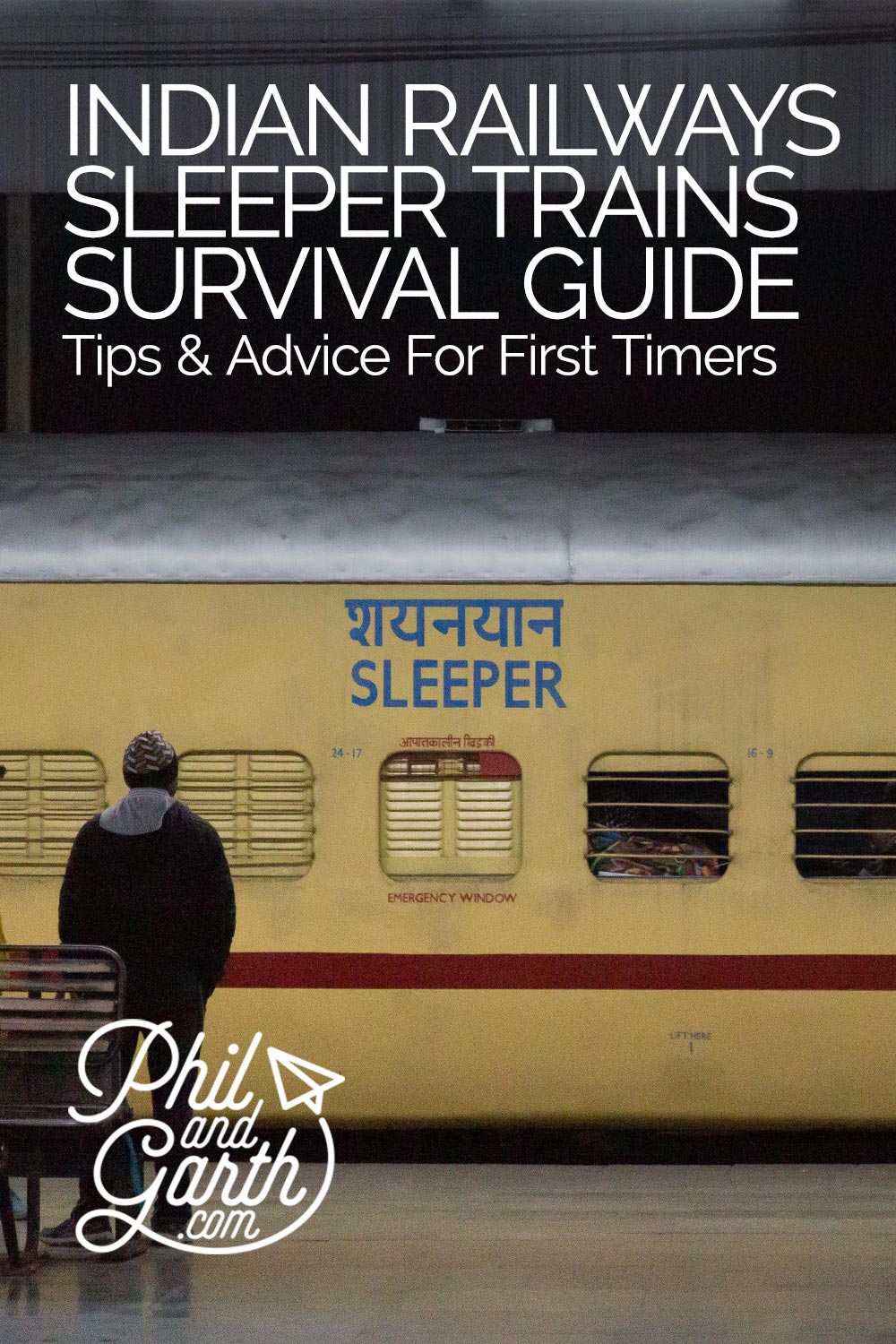
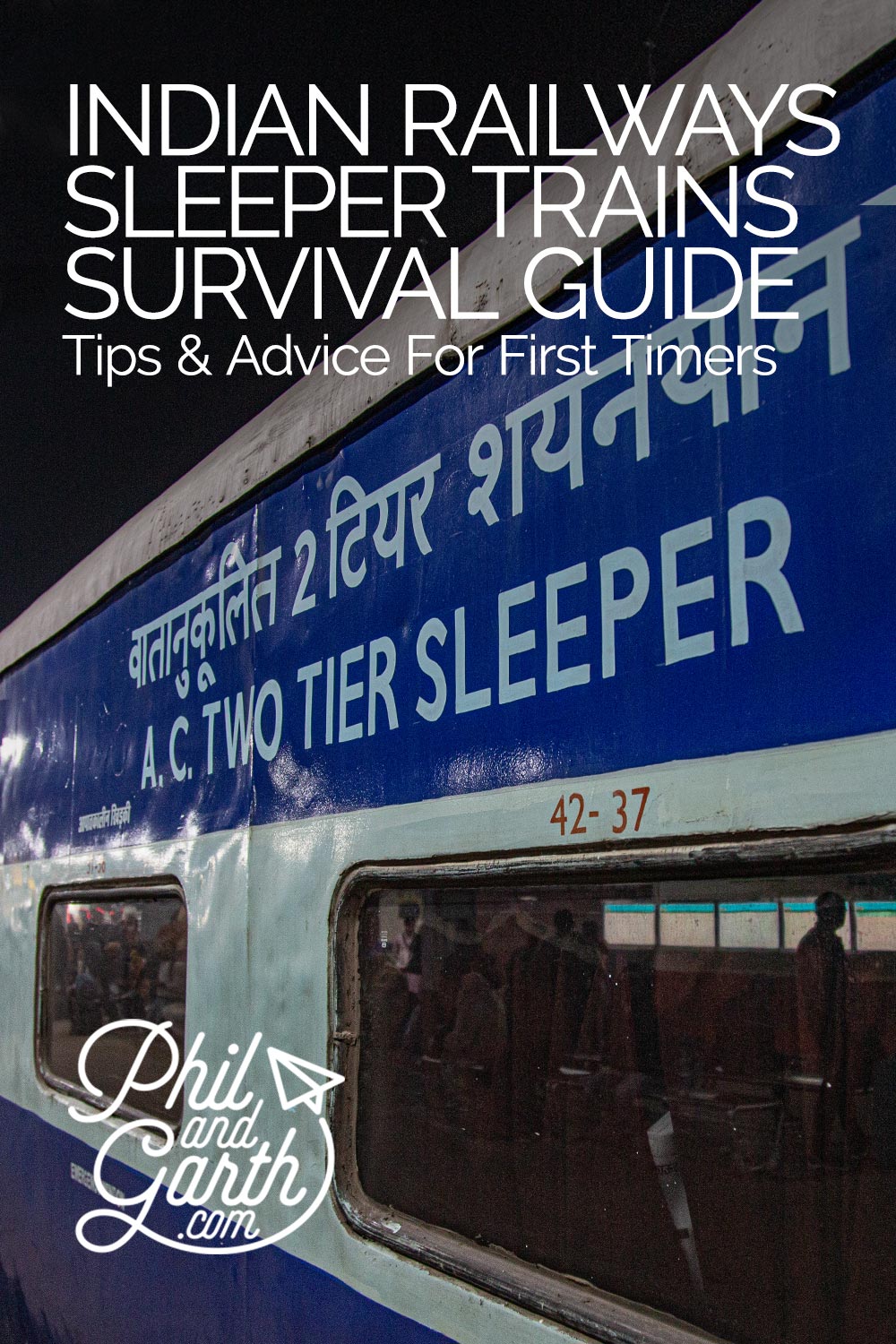
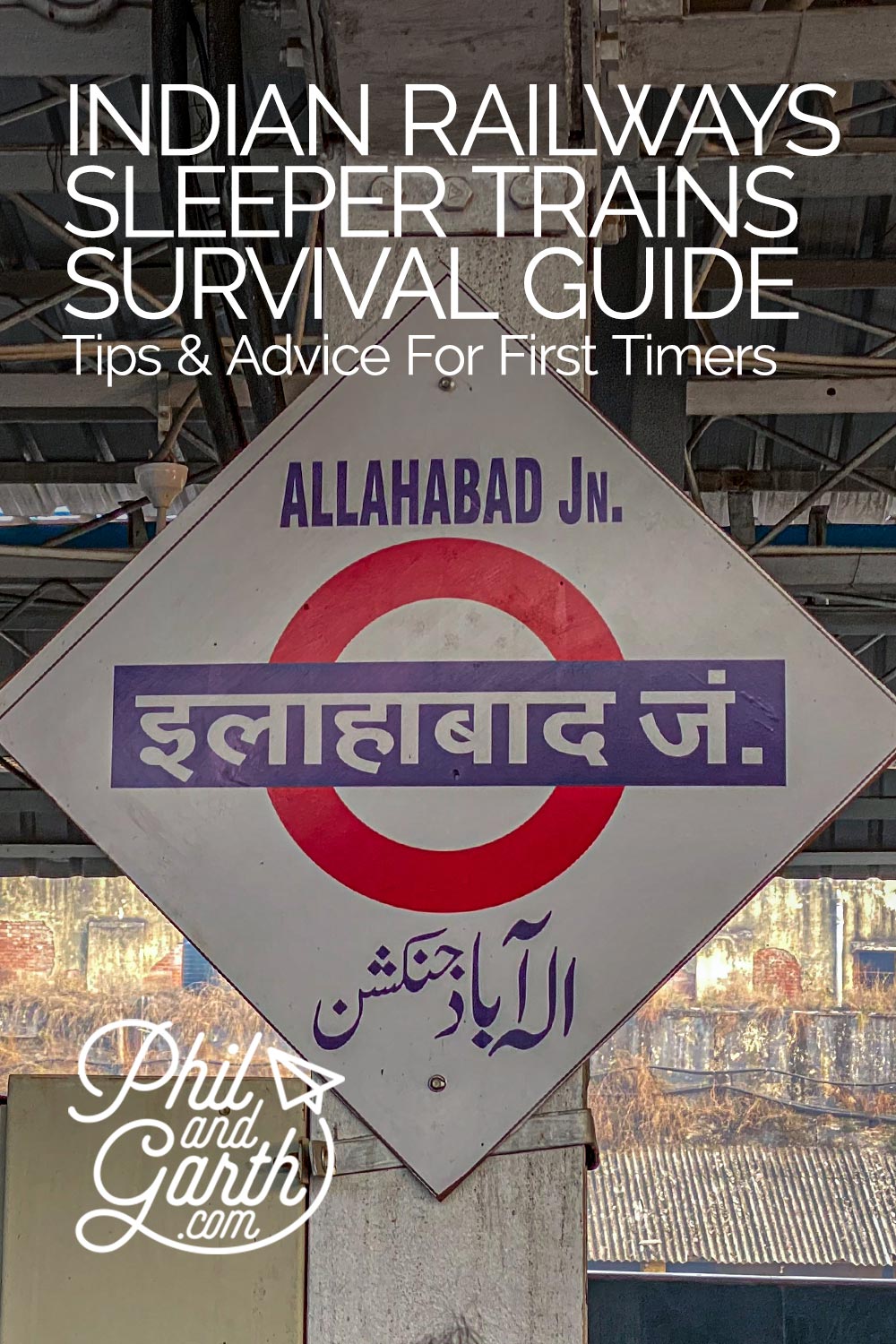
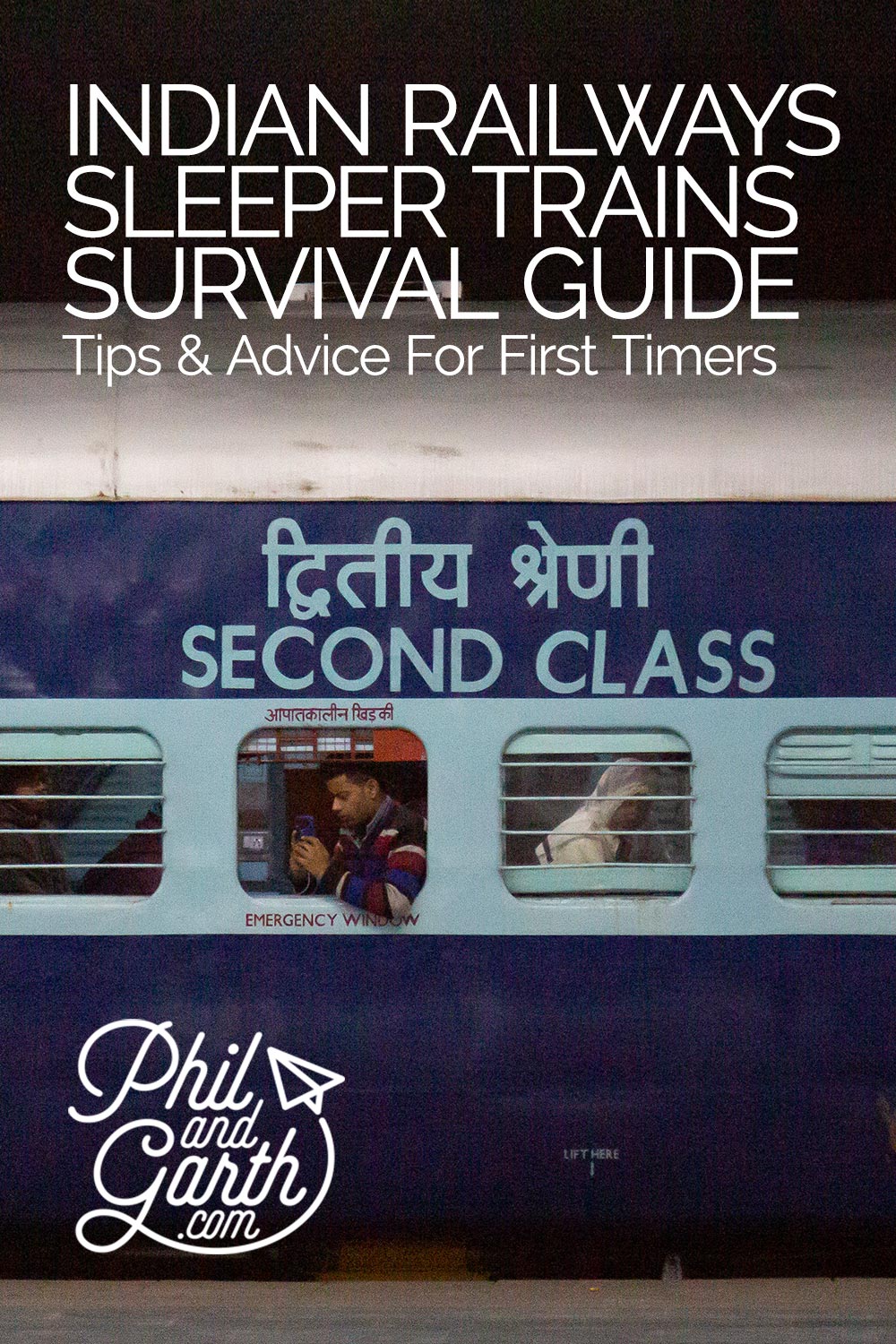
1 comment
A lot of sensible info from “hard” experience, I recall the smell from similar facilities on old RENFE trains back in the 60’s.
I hope to splash out and go 1A on some sleepers.